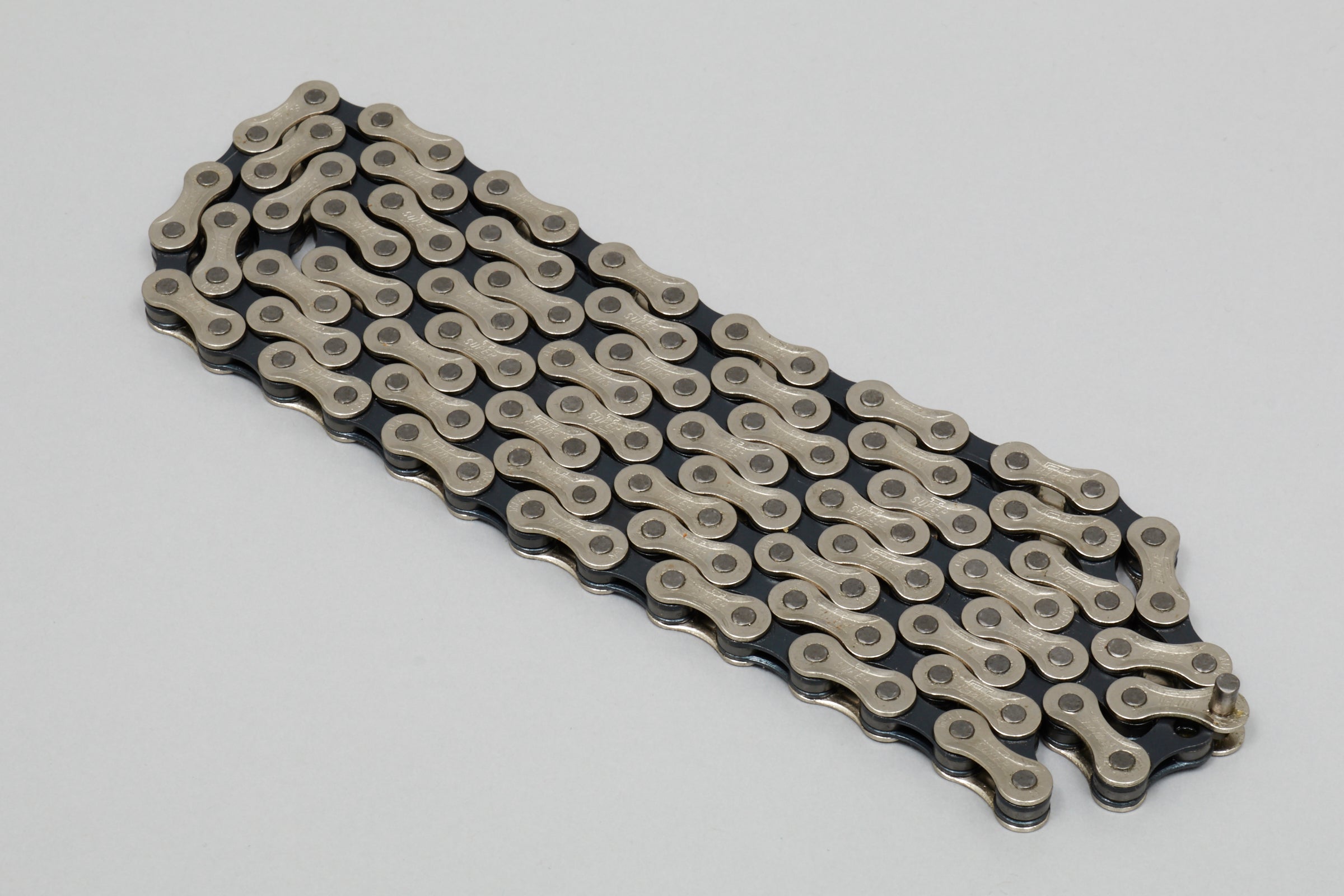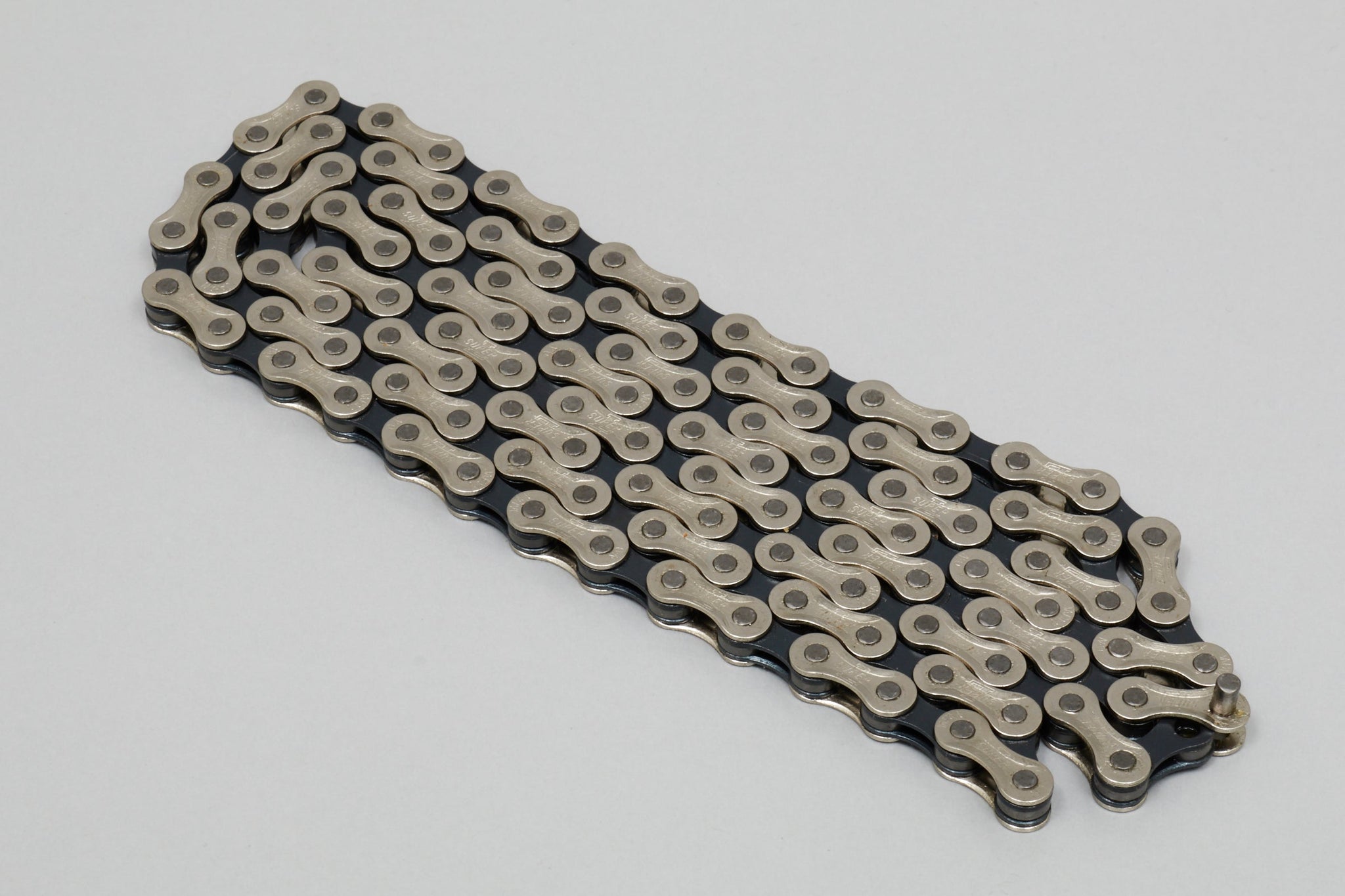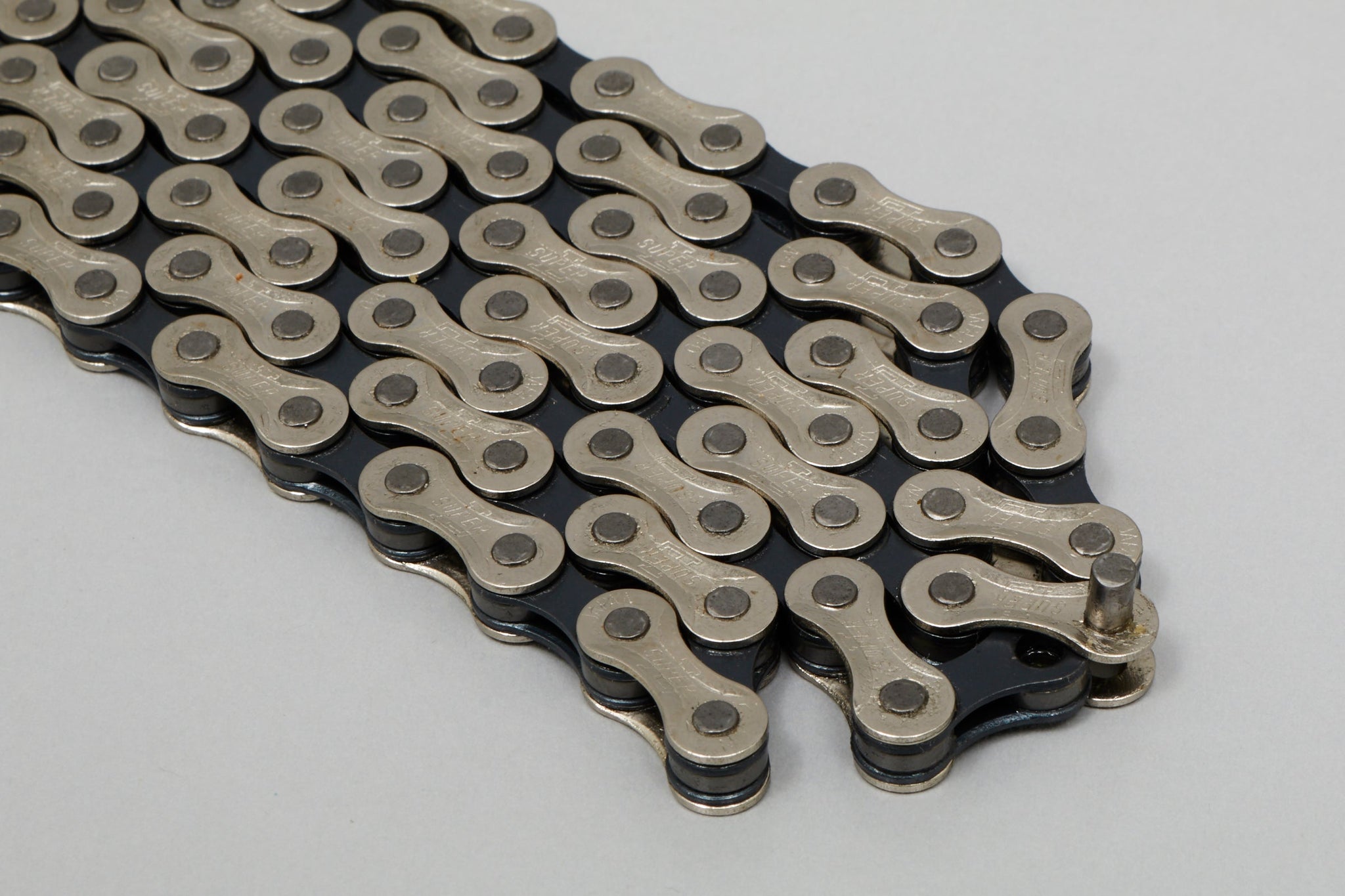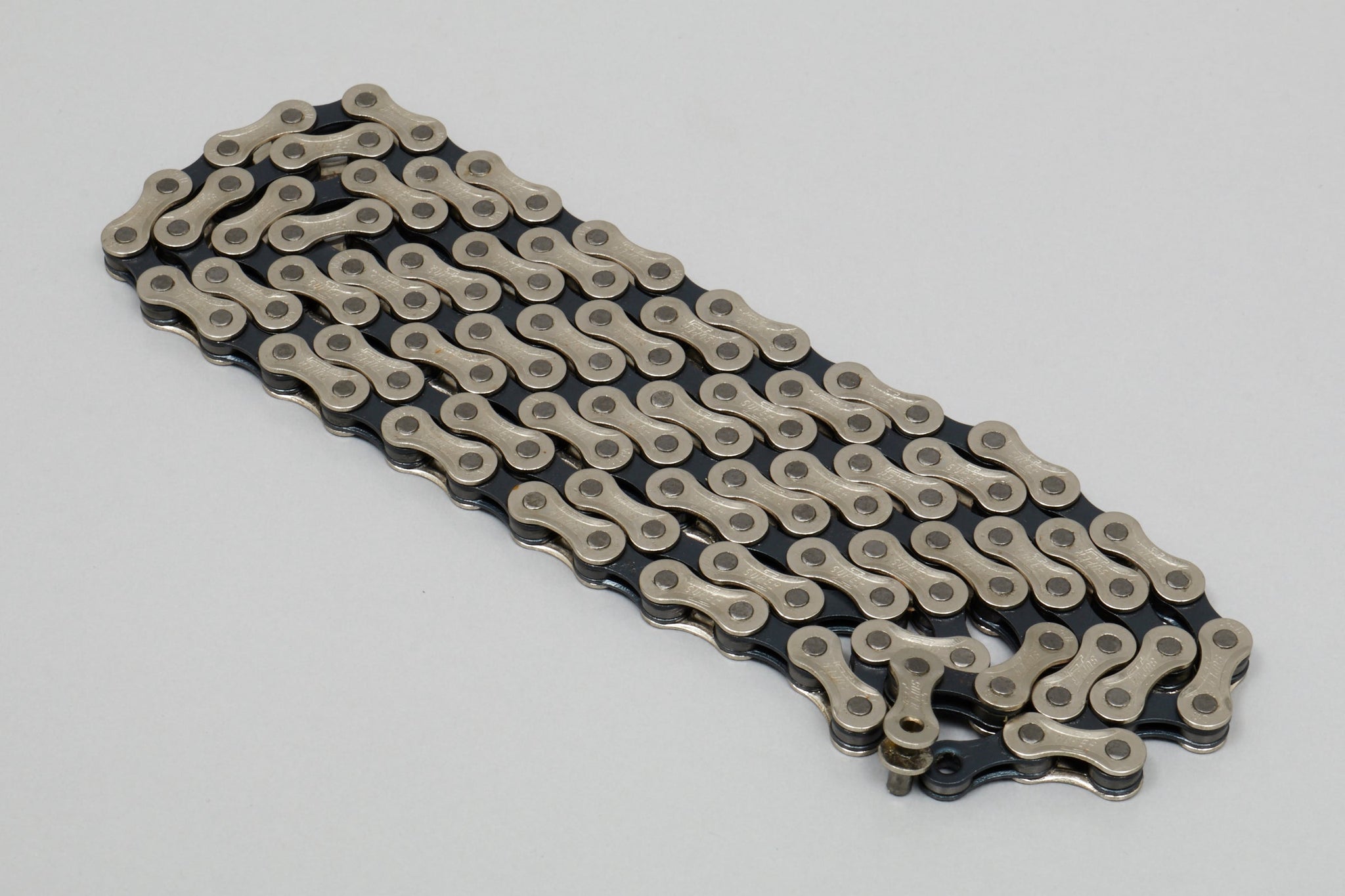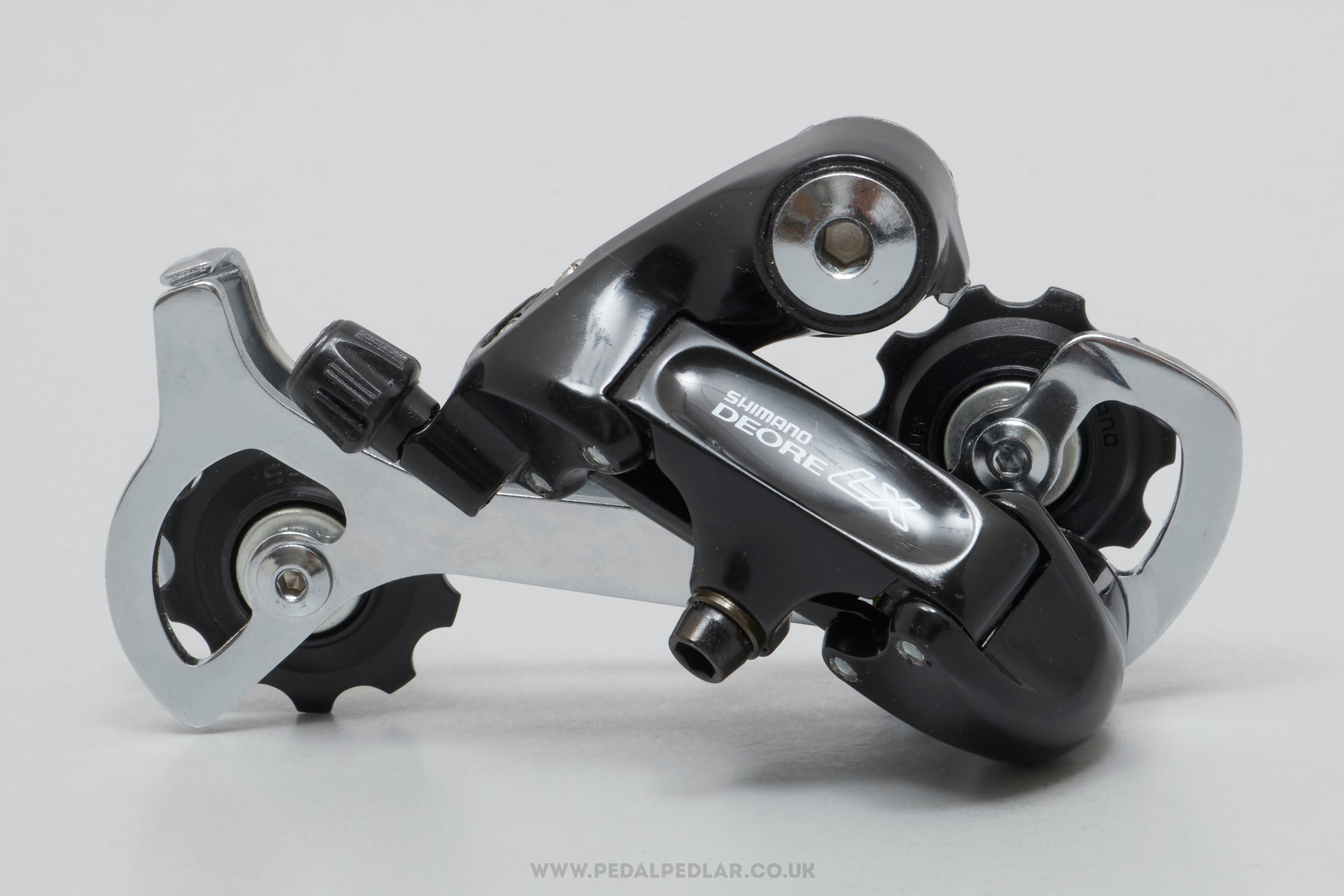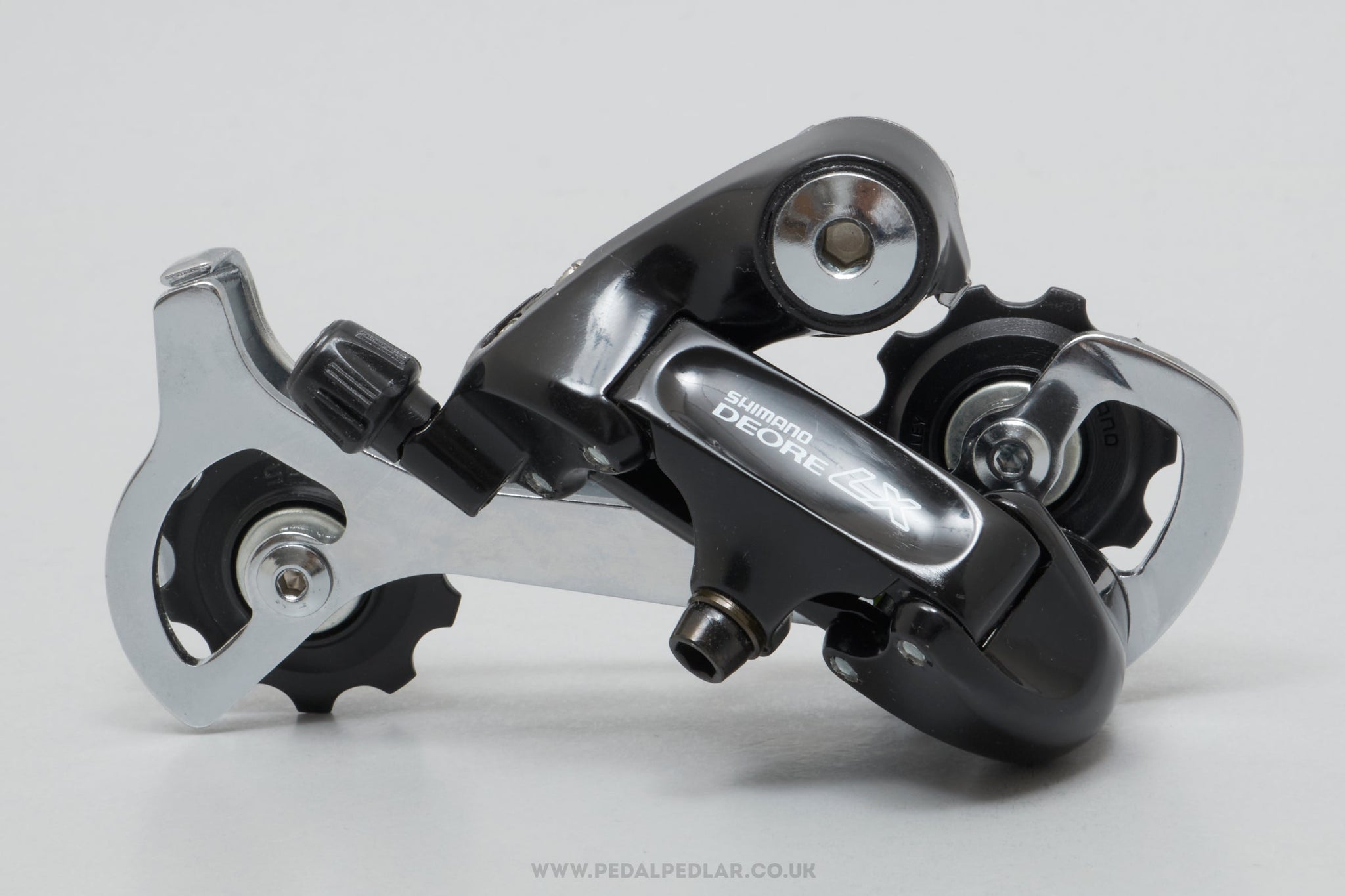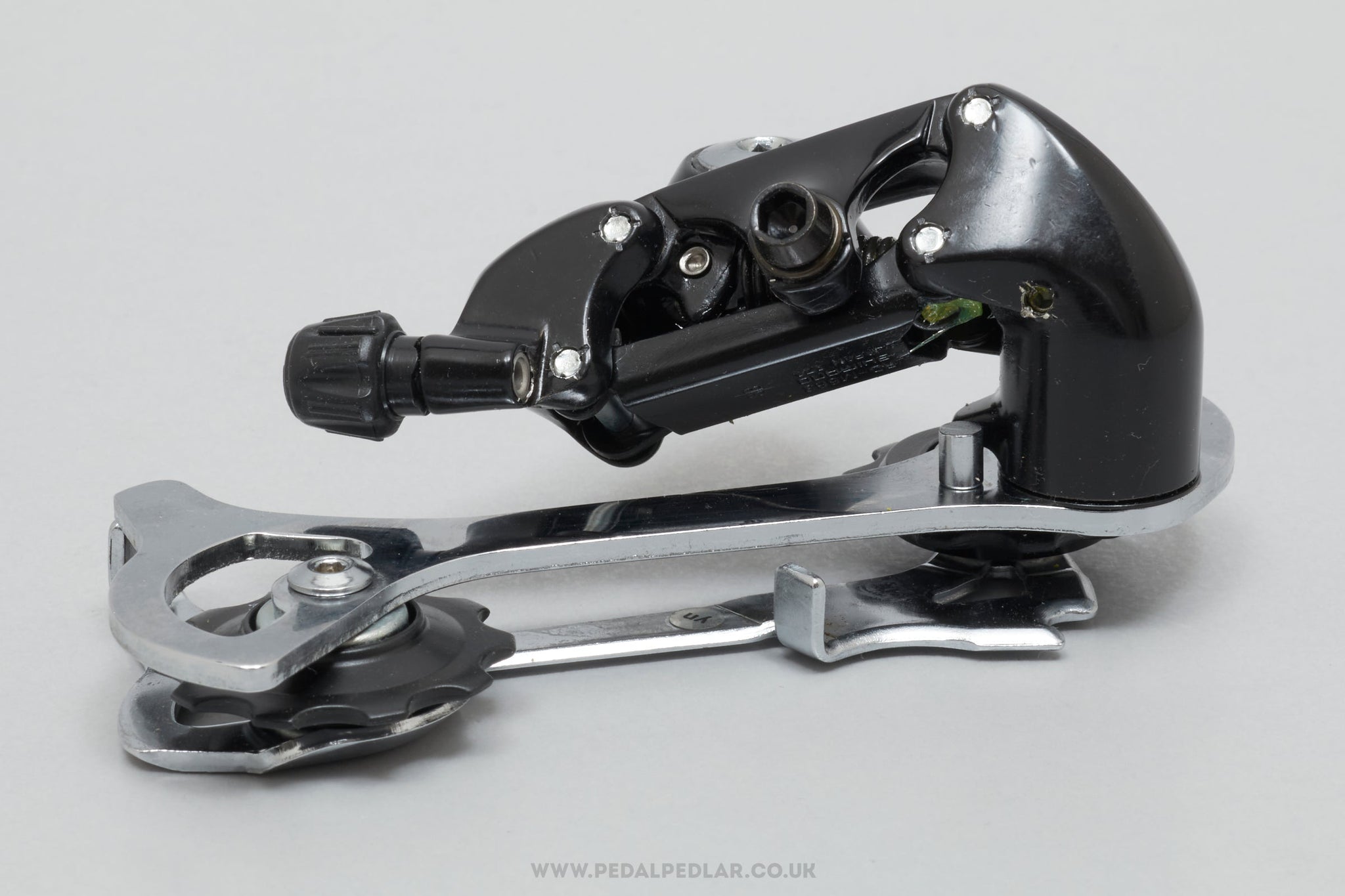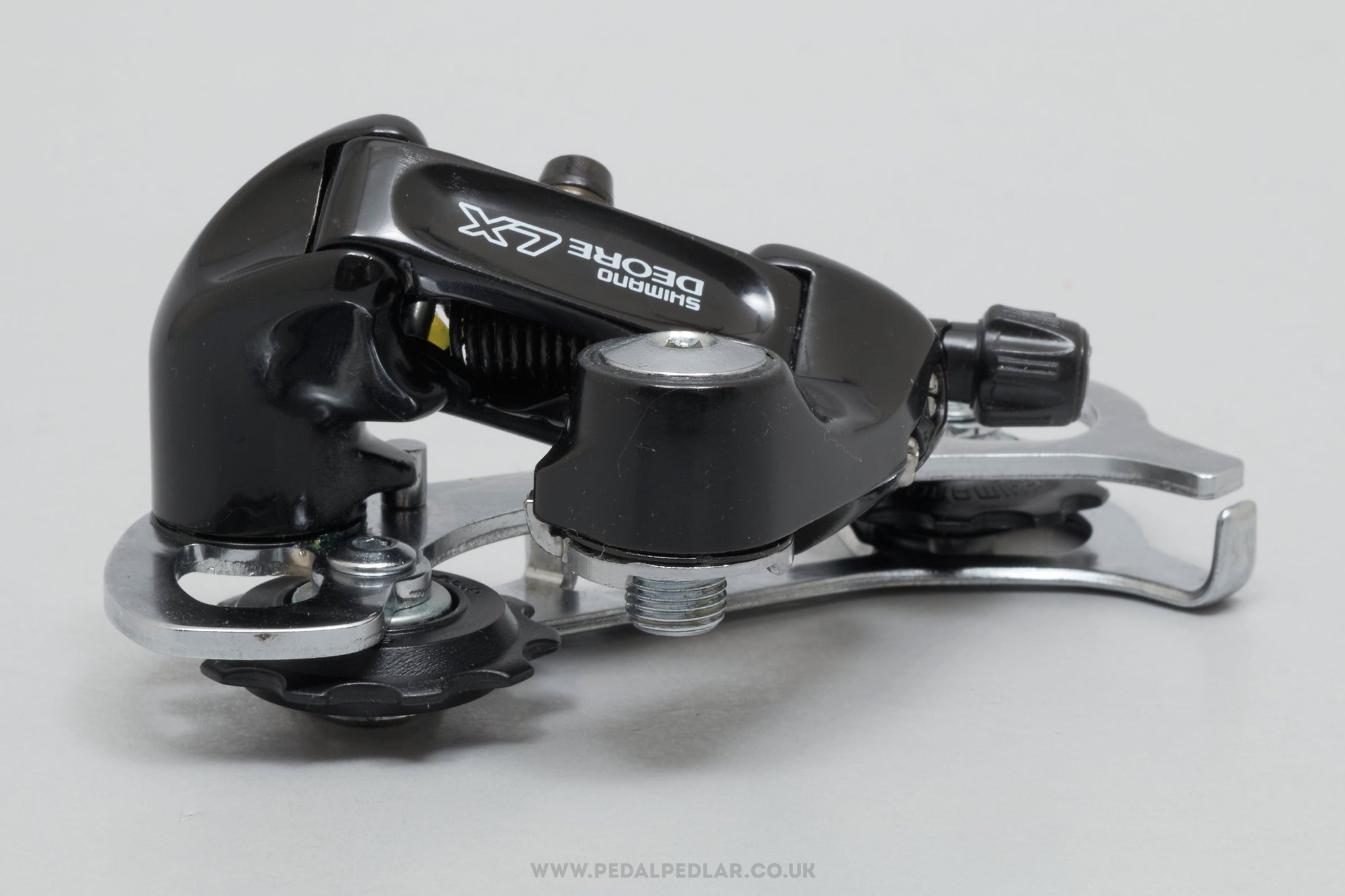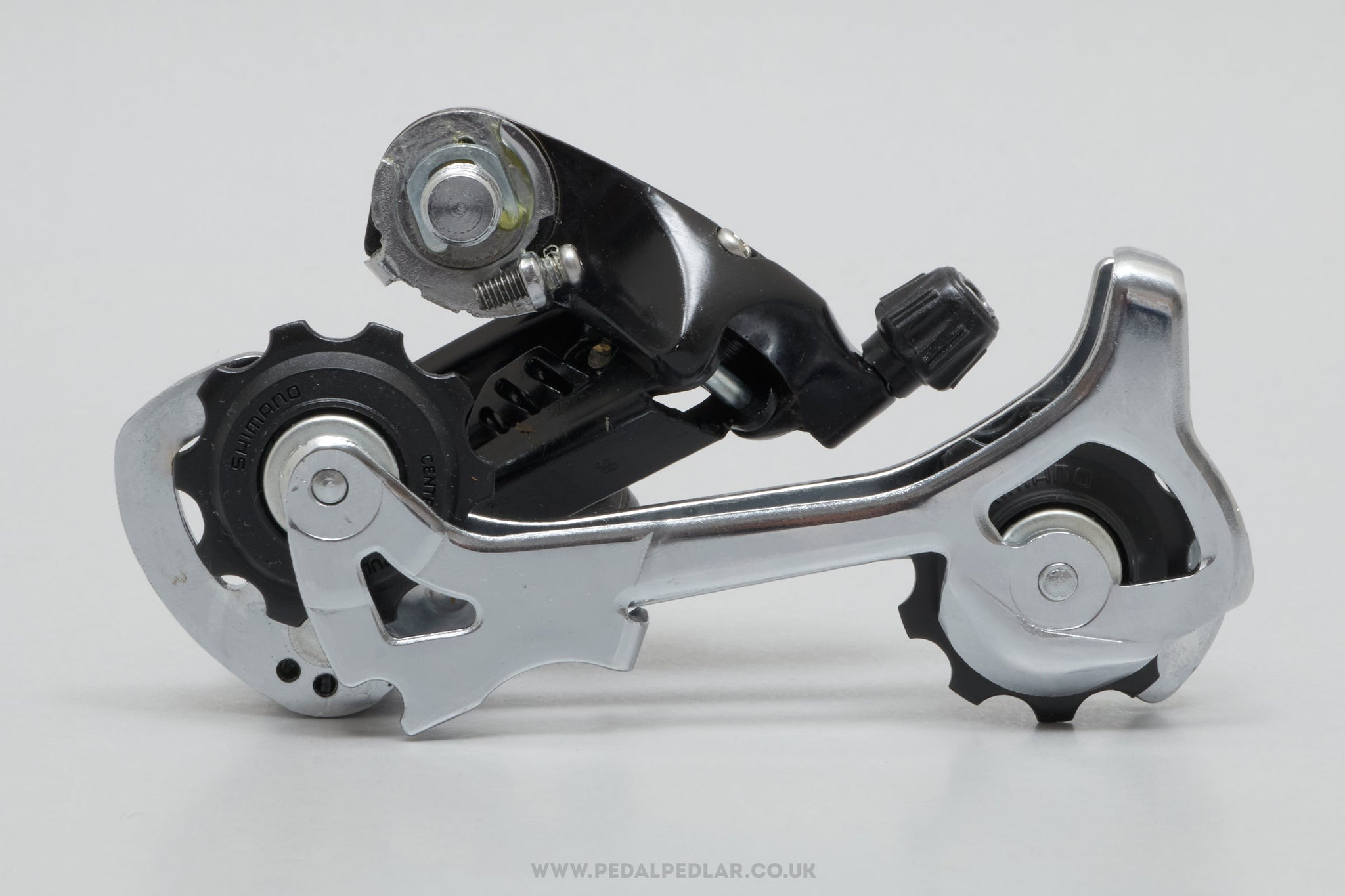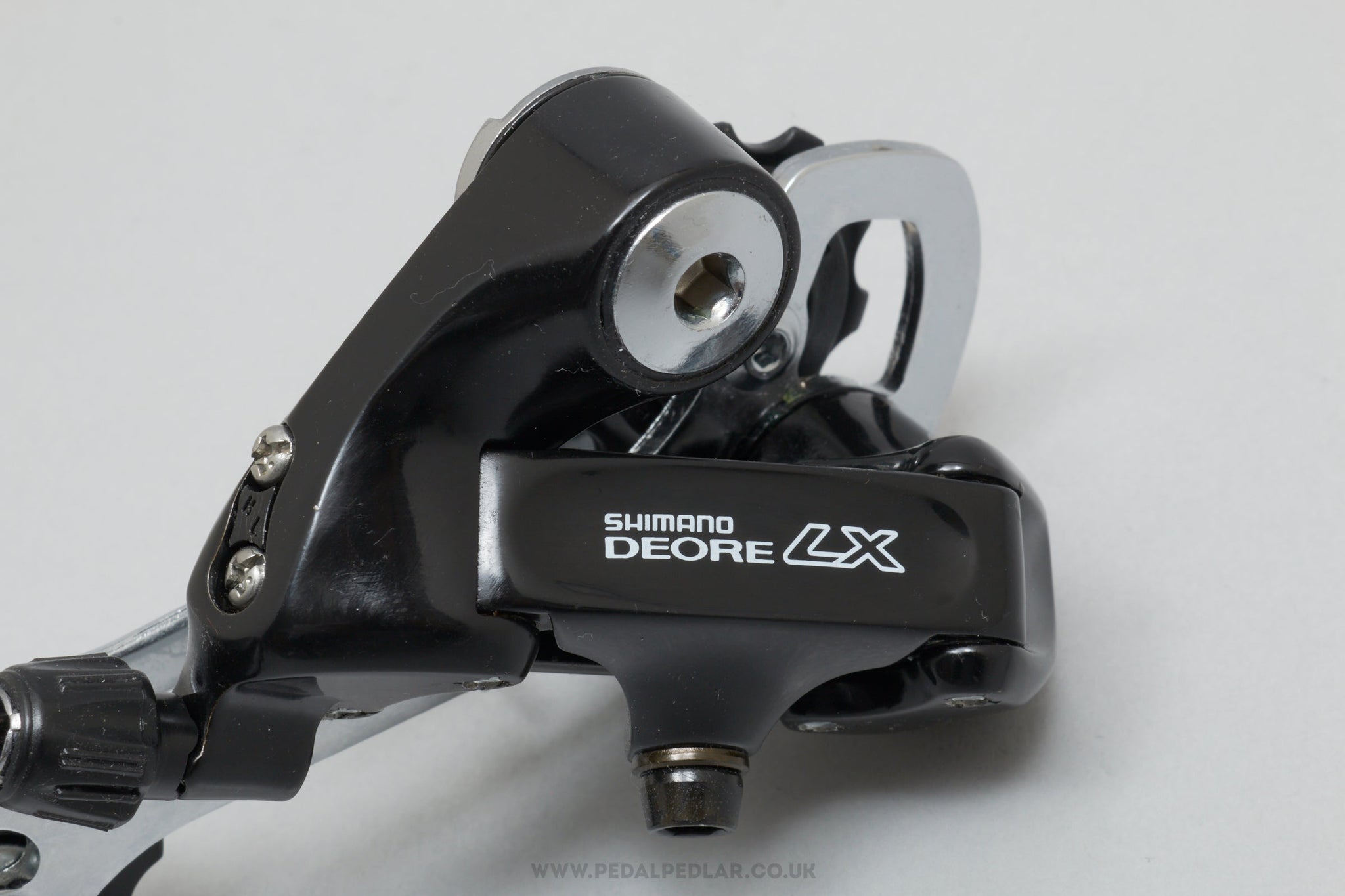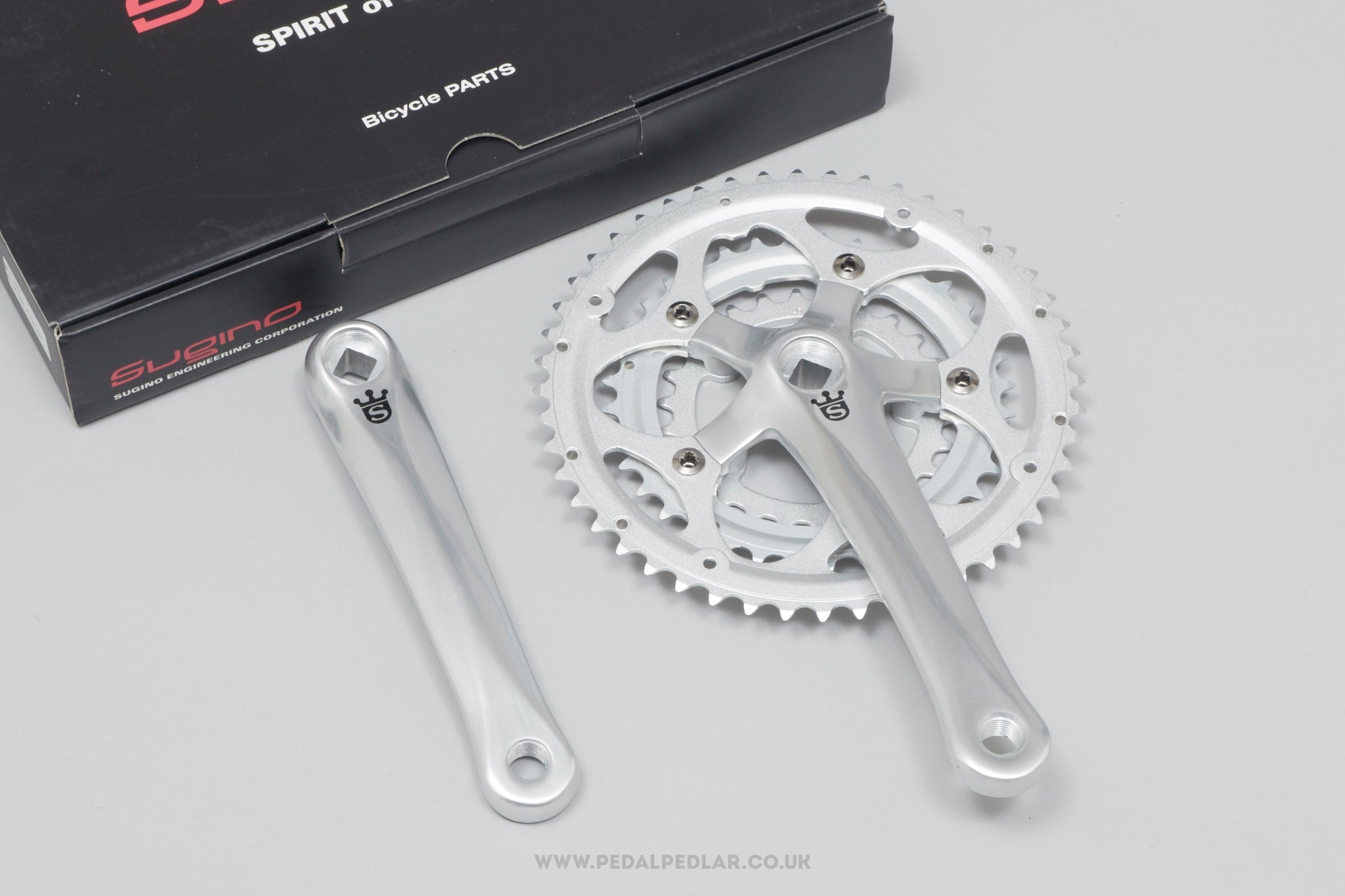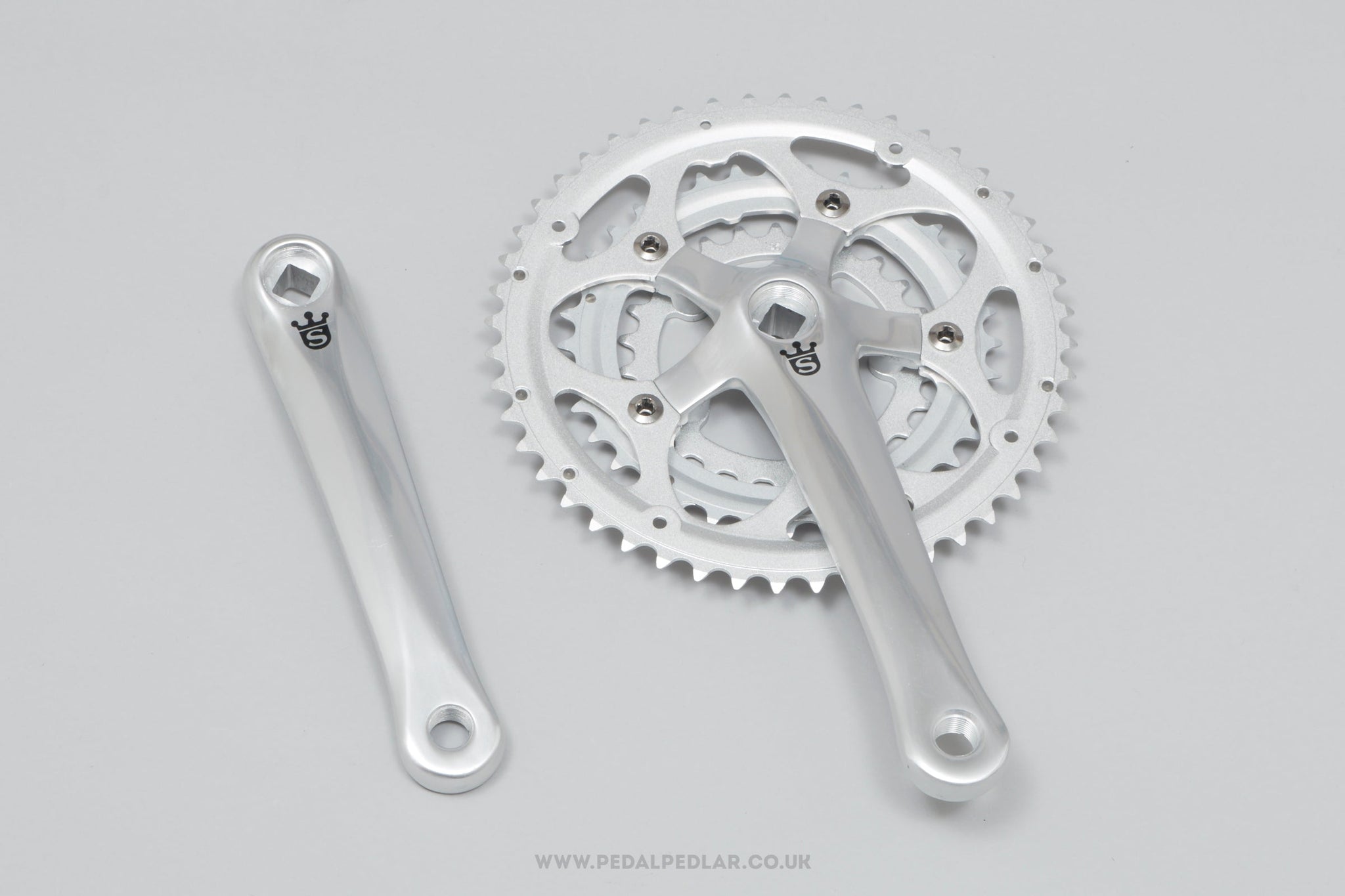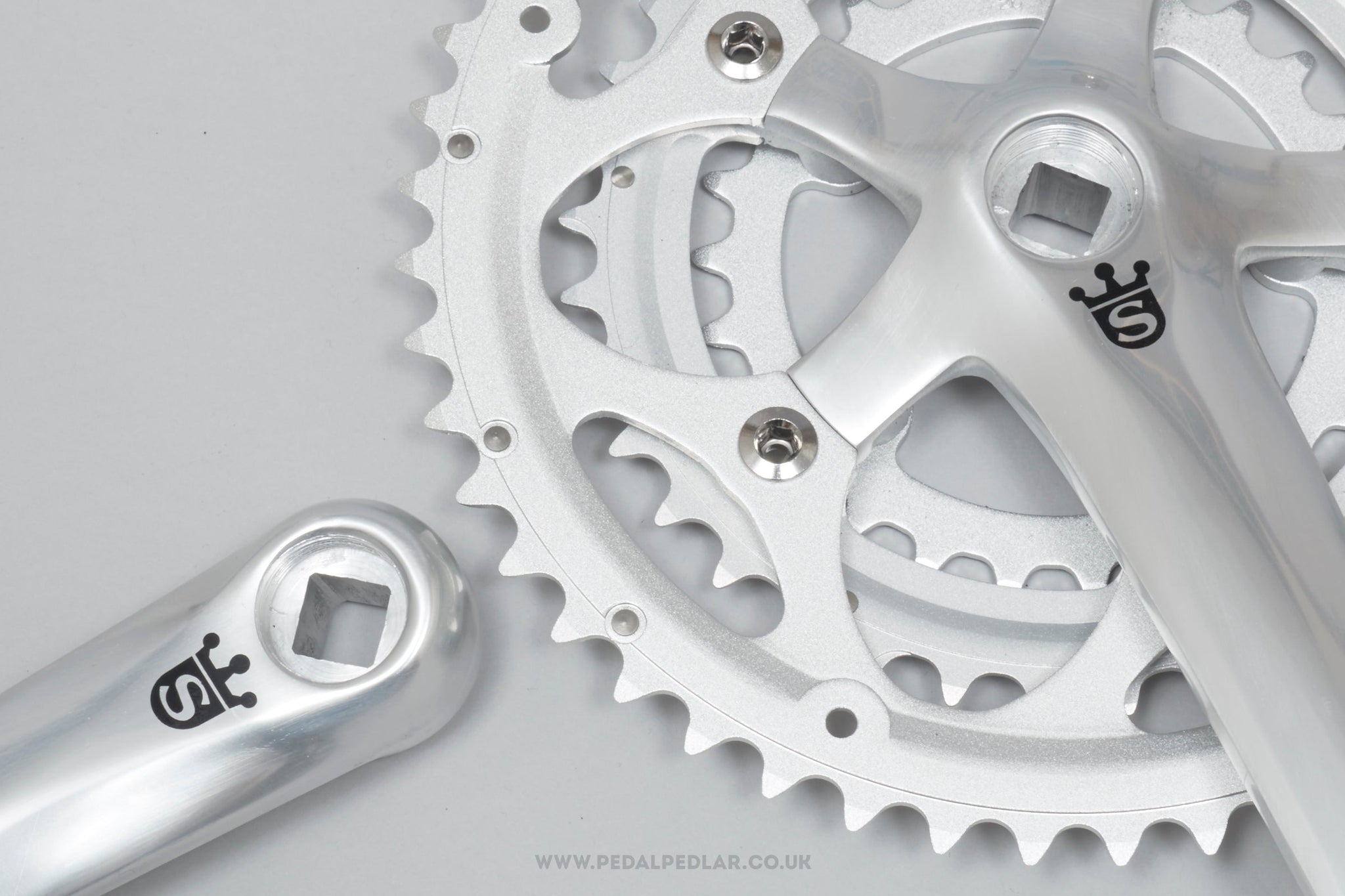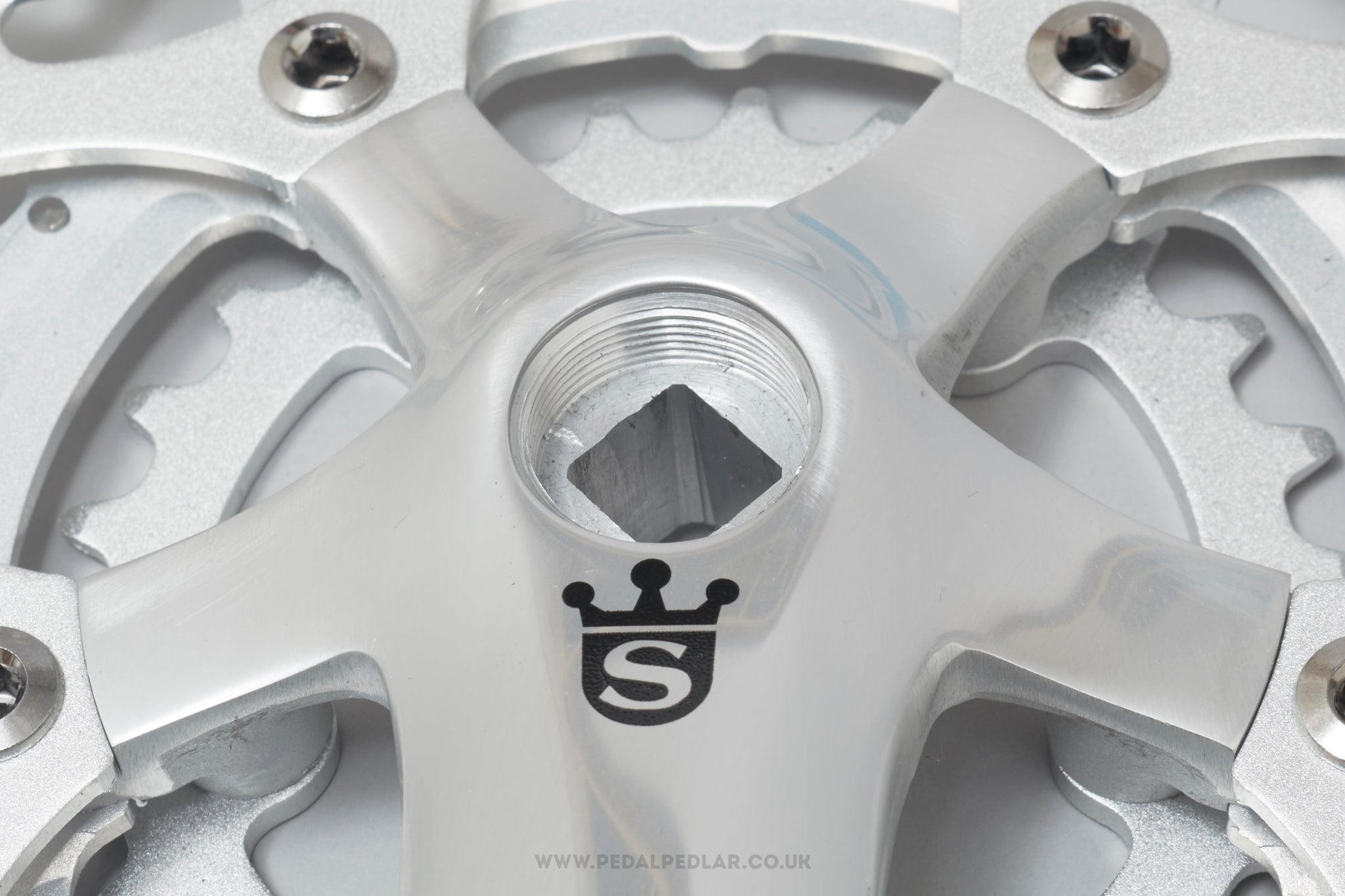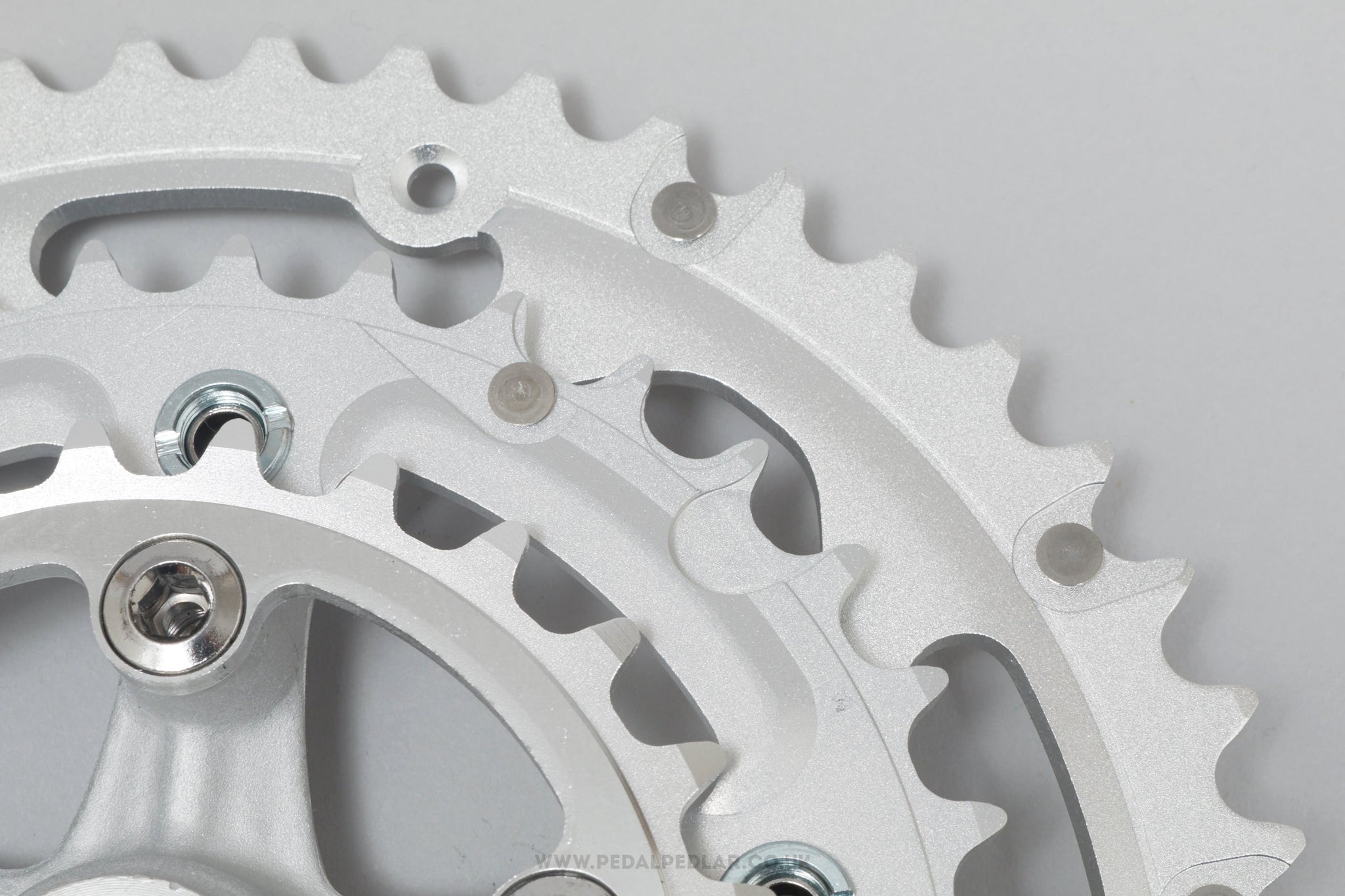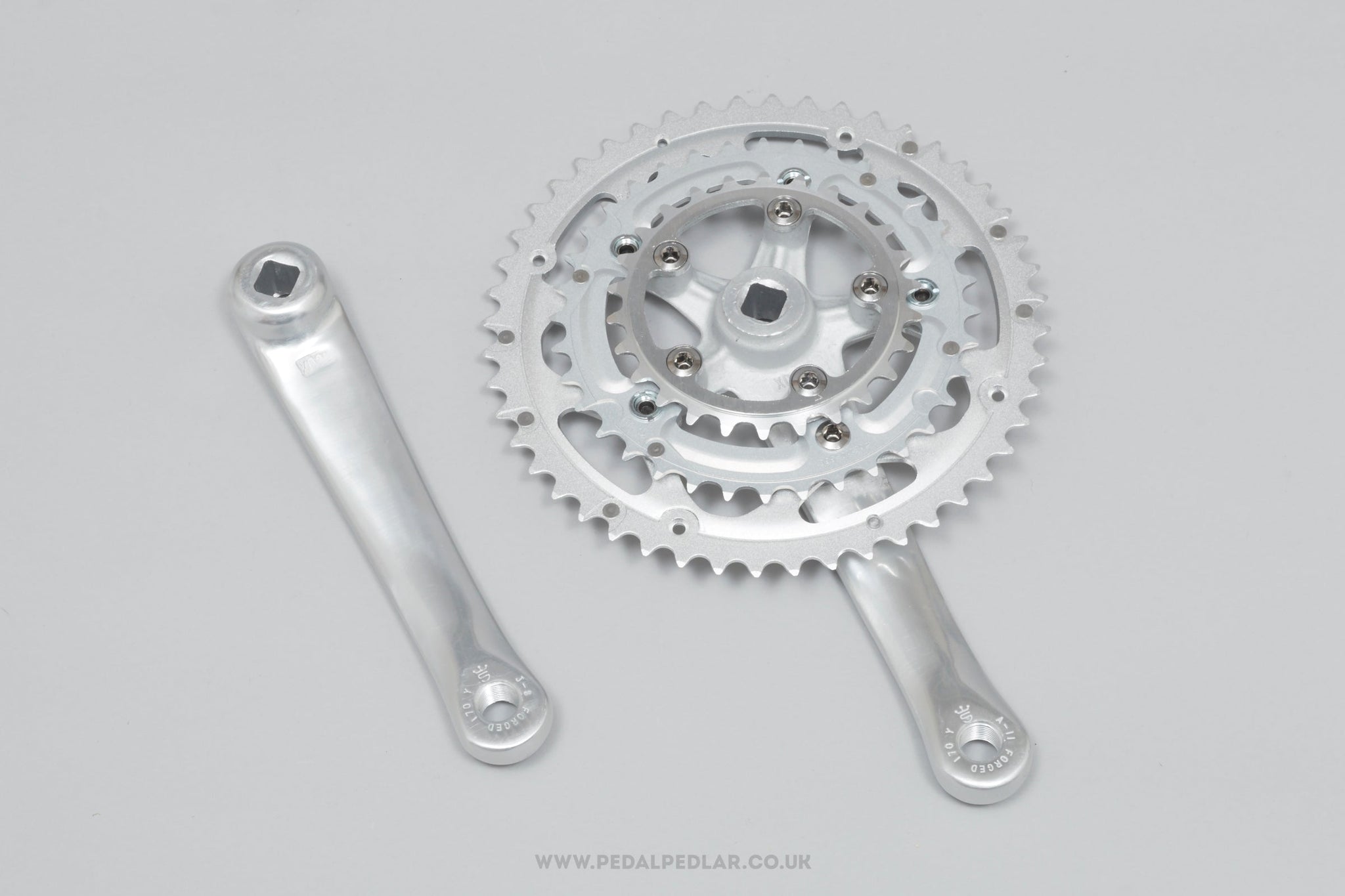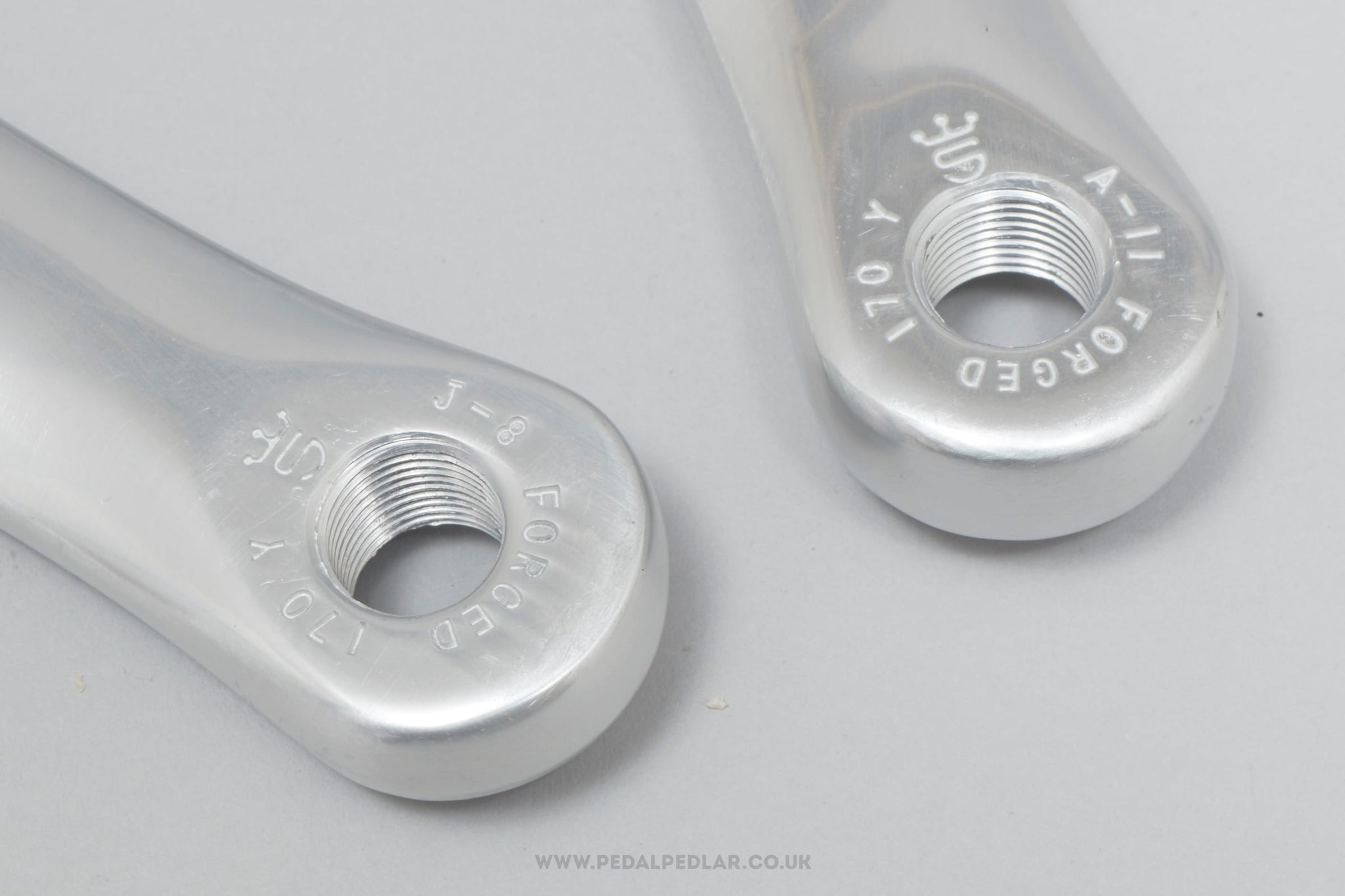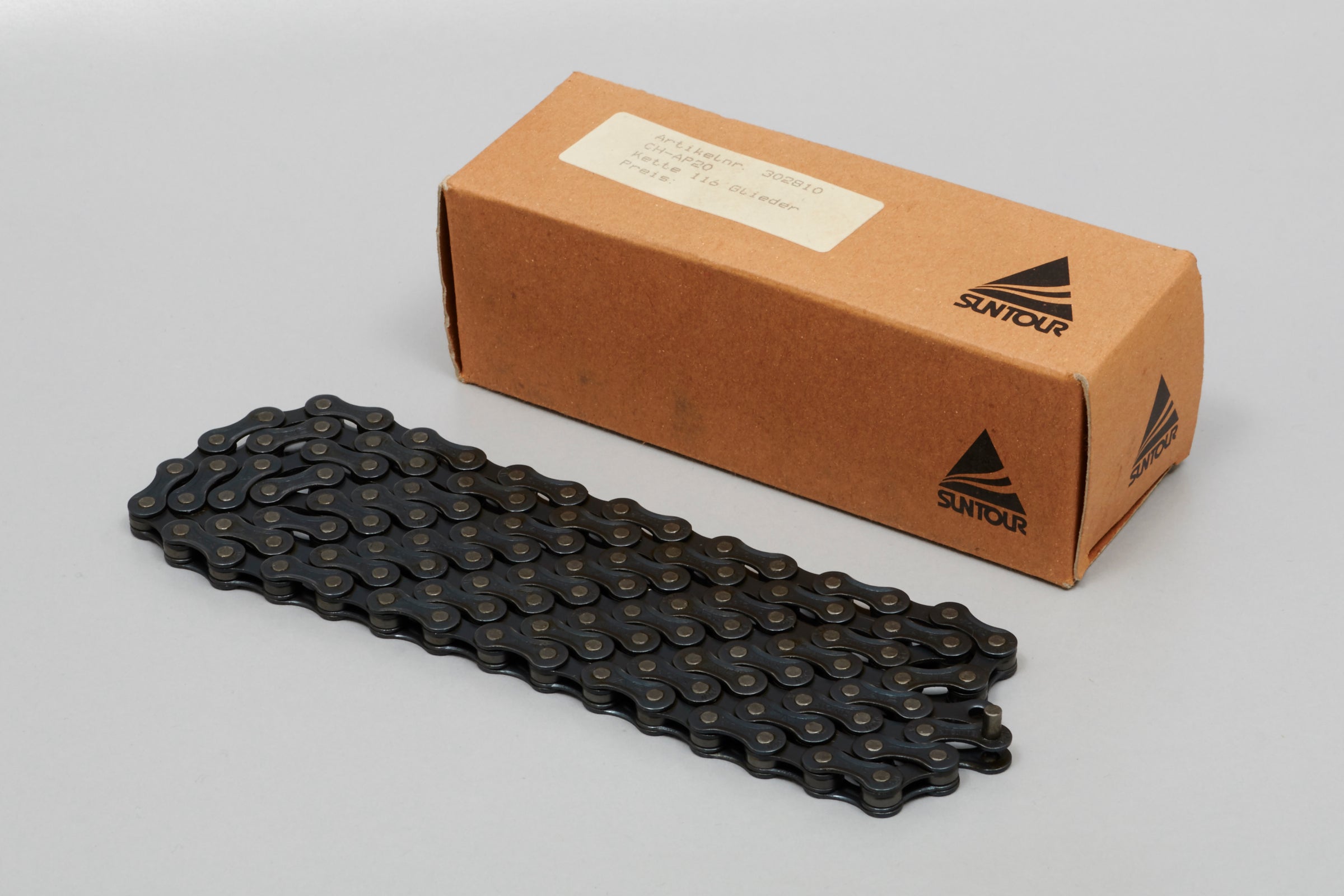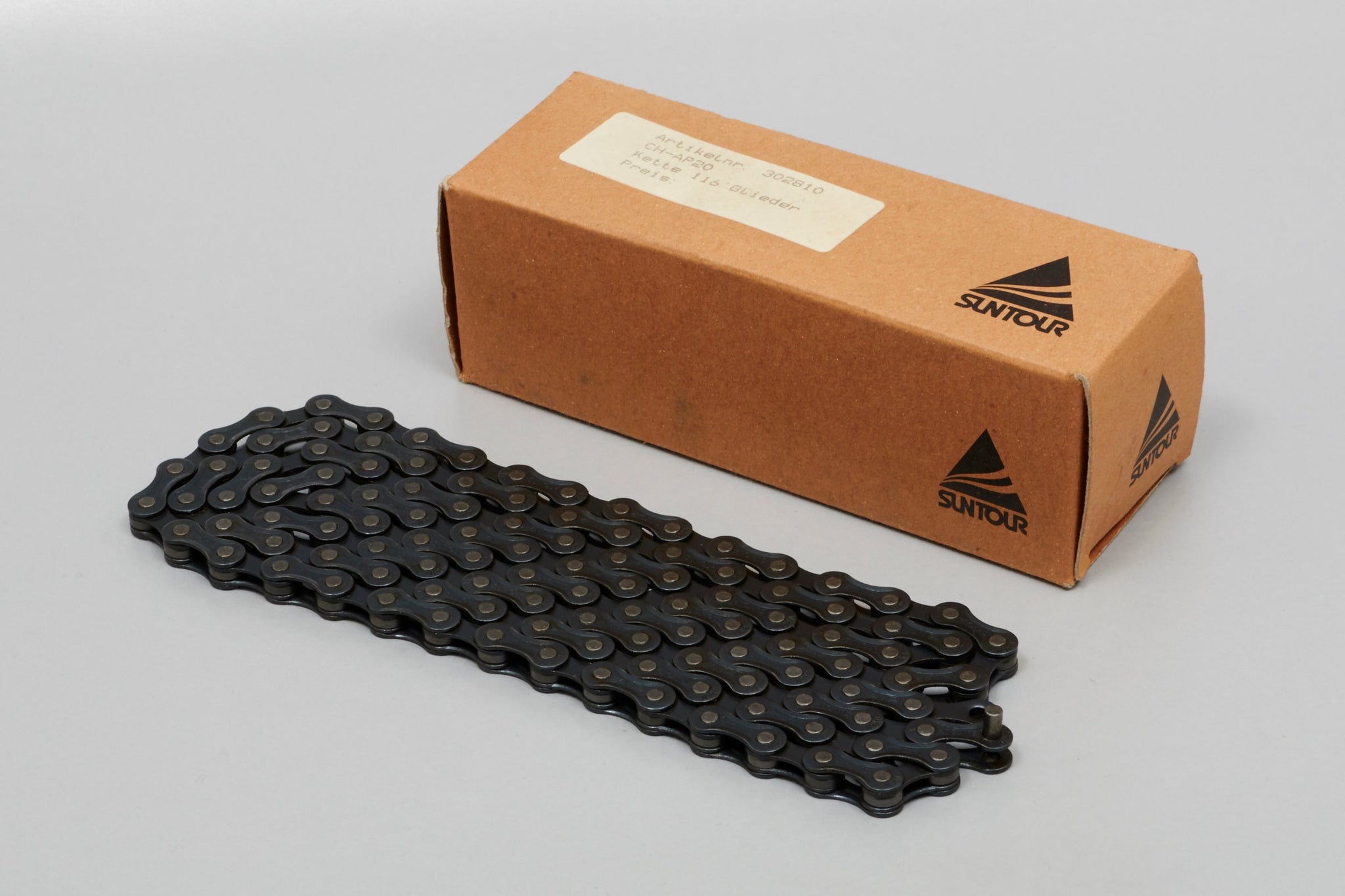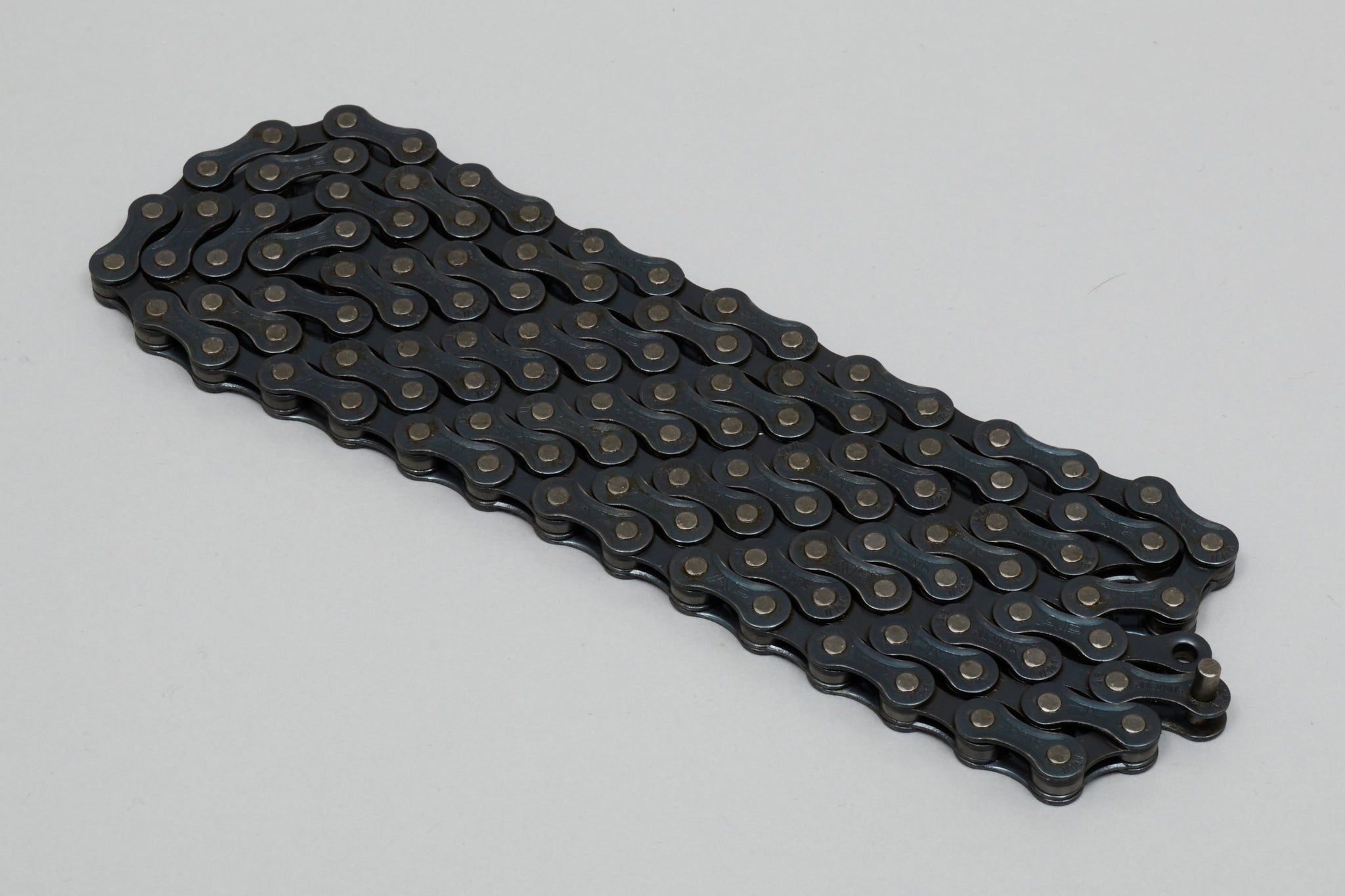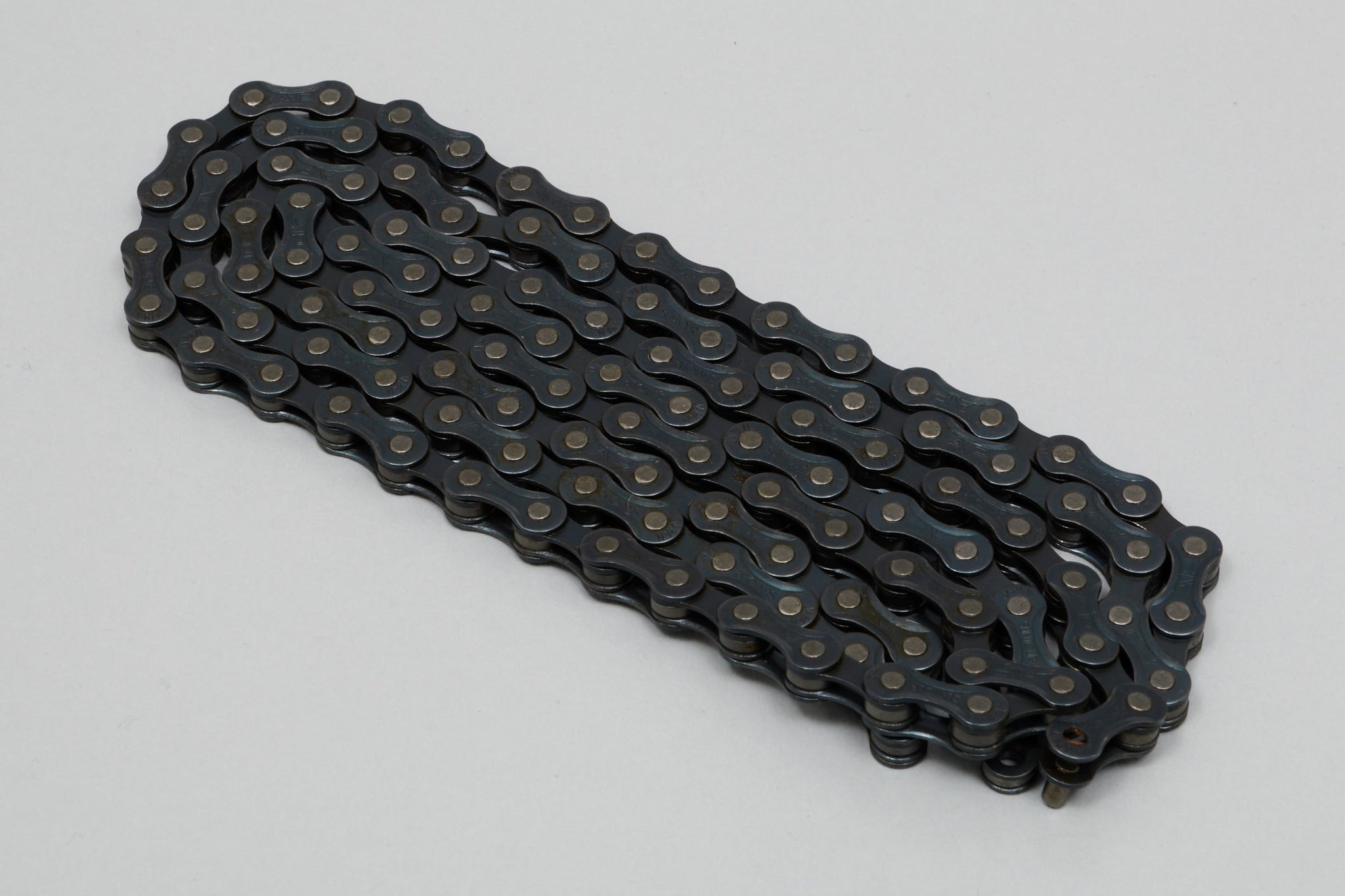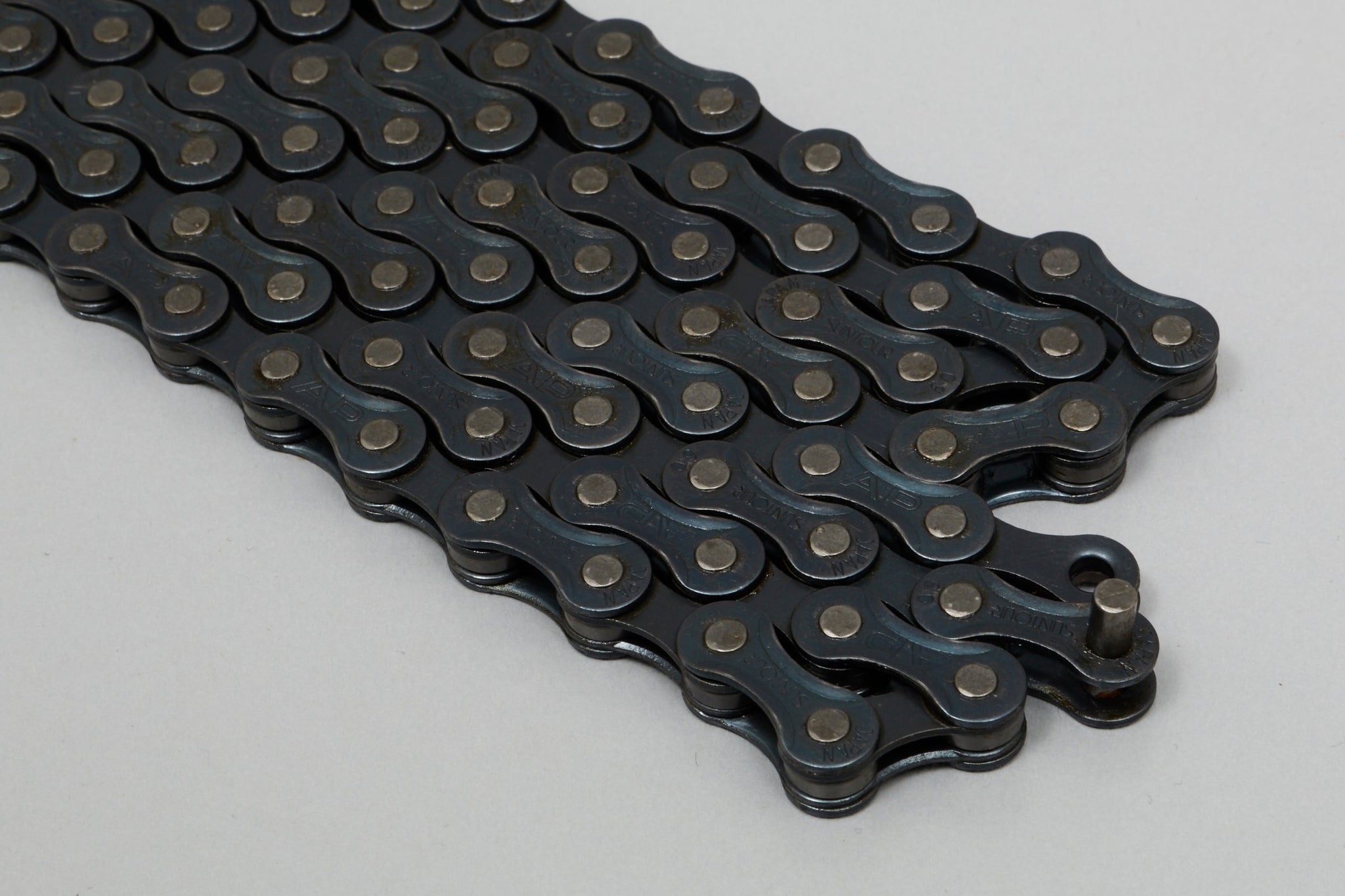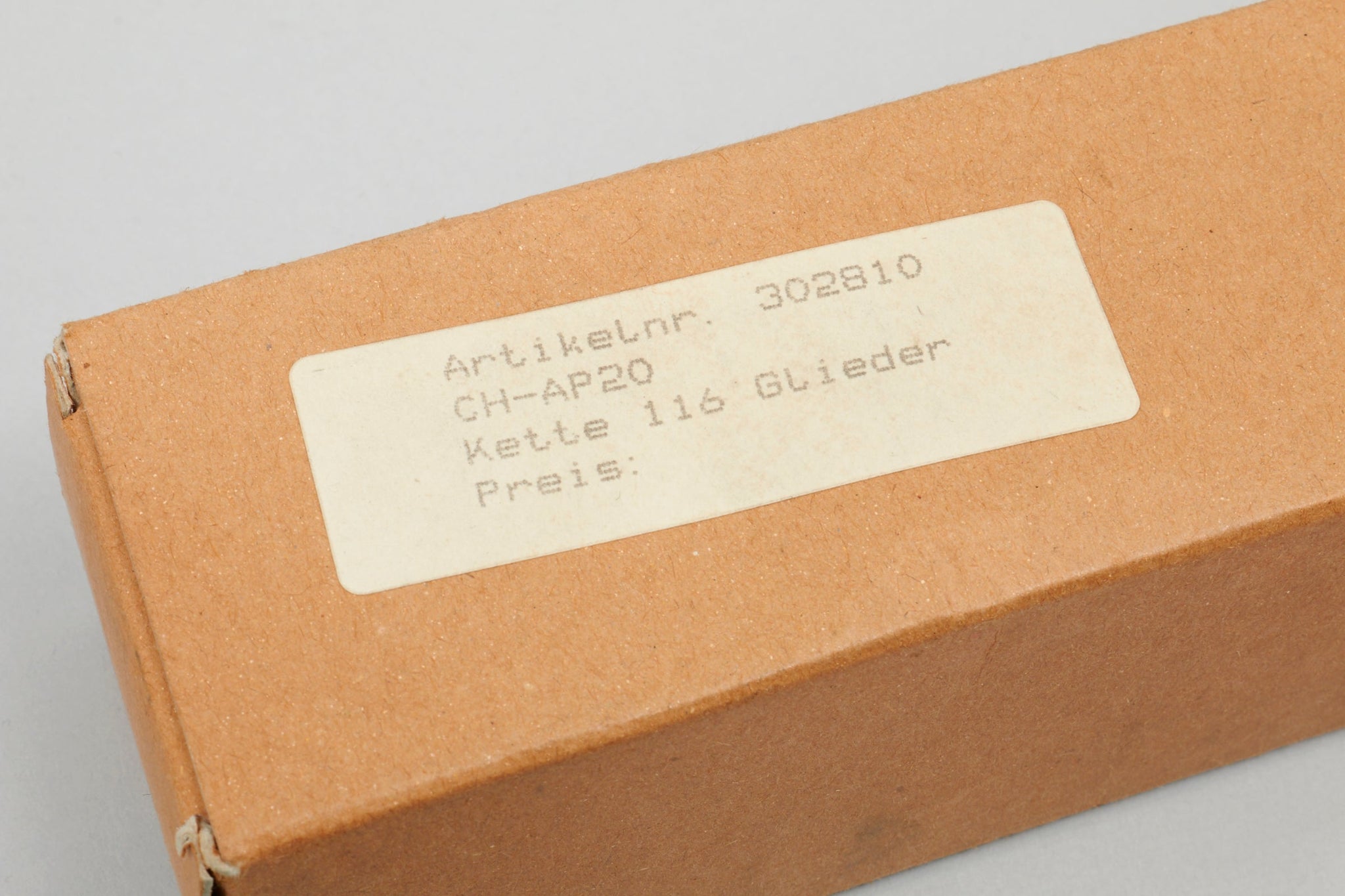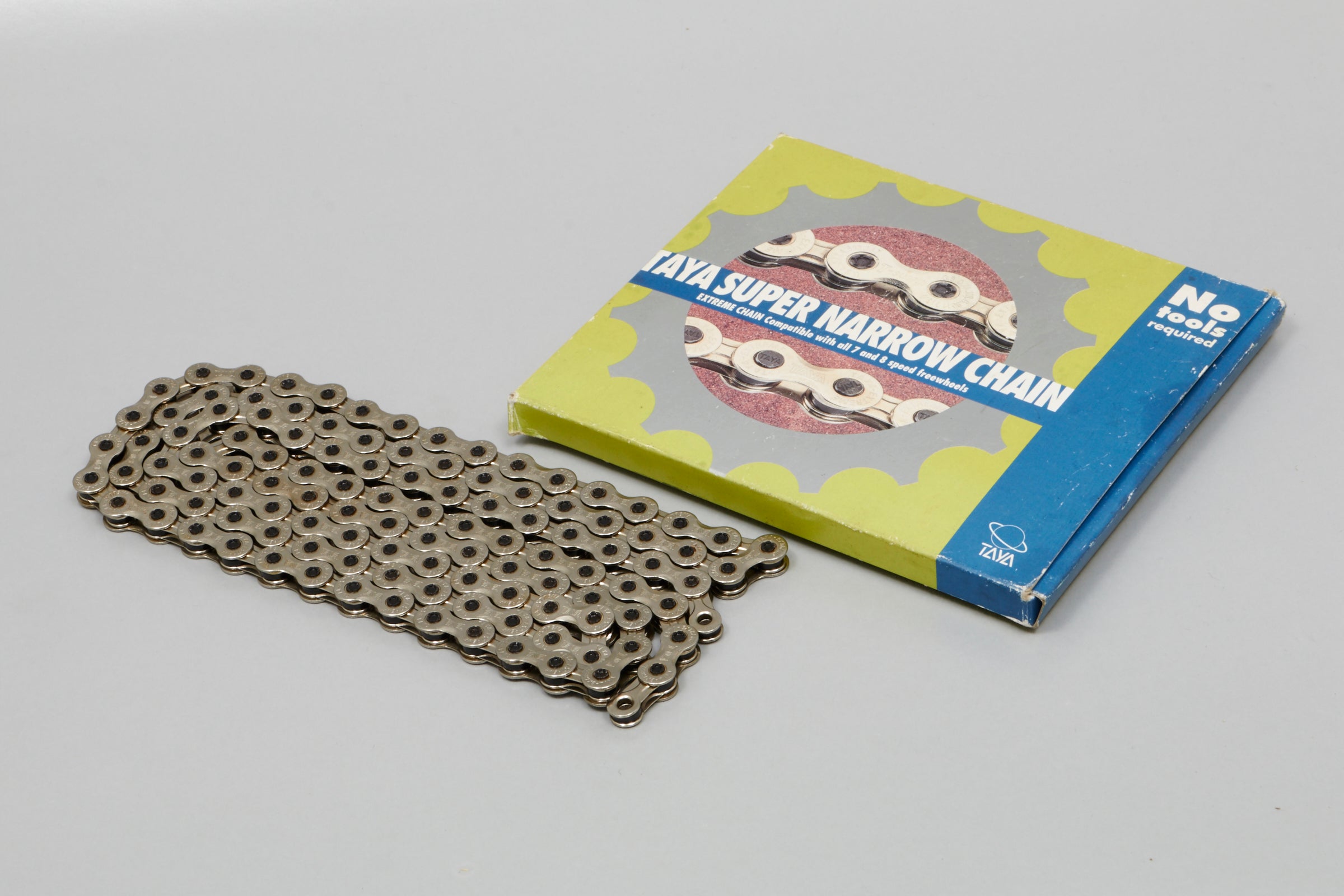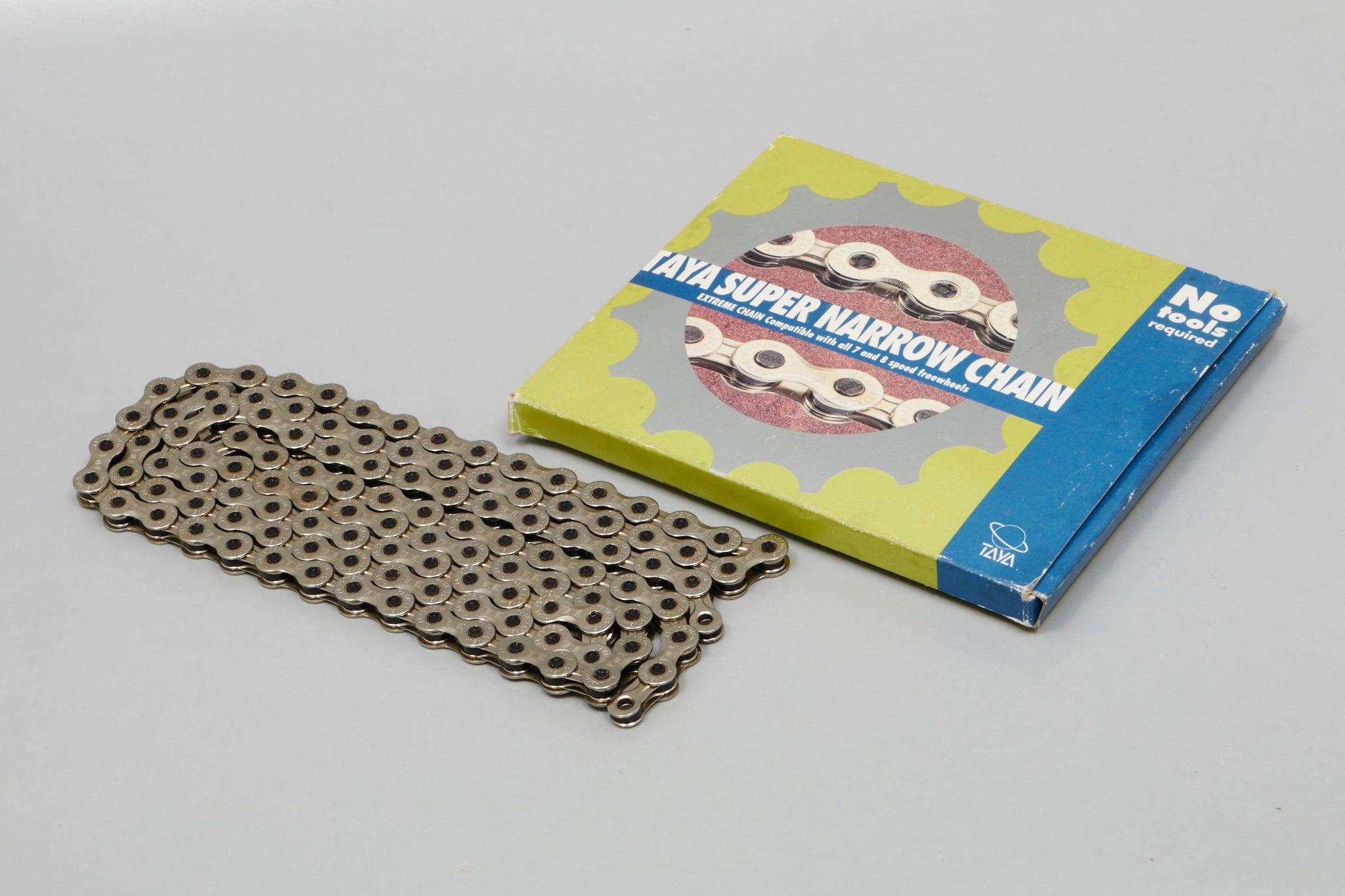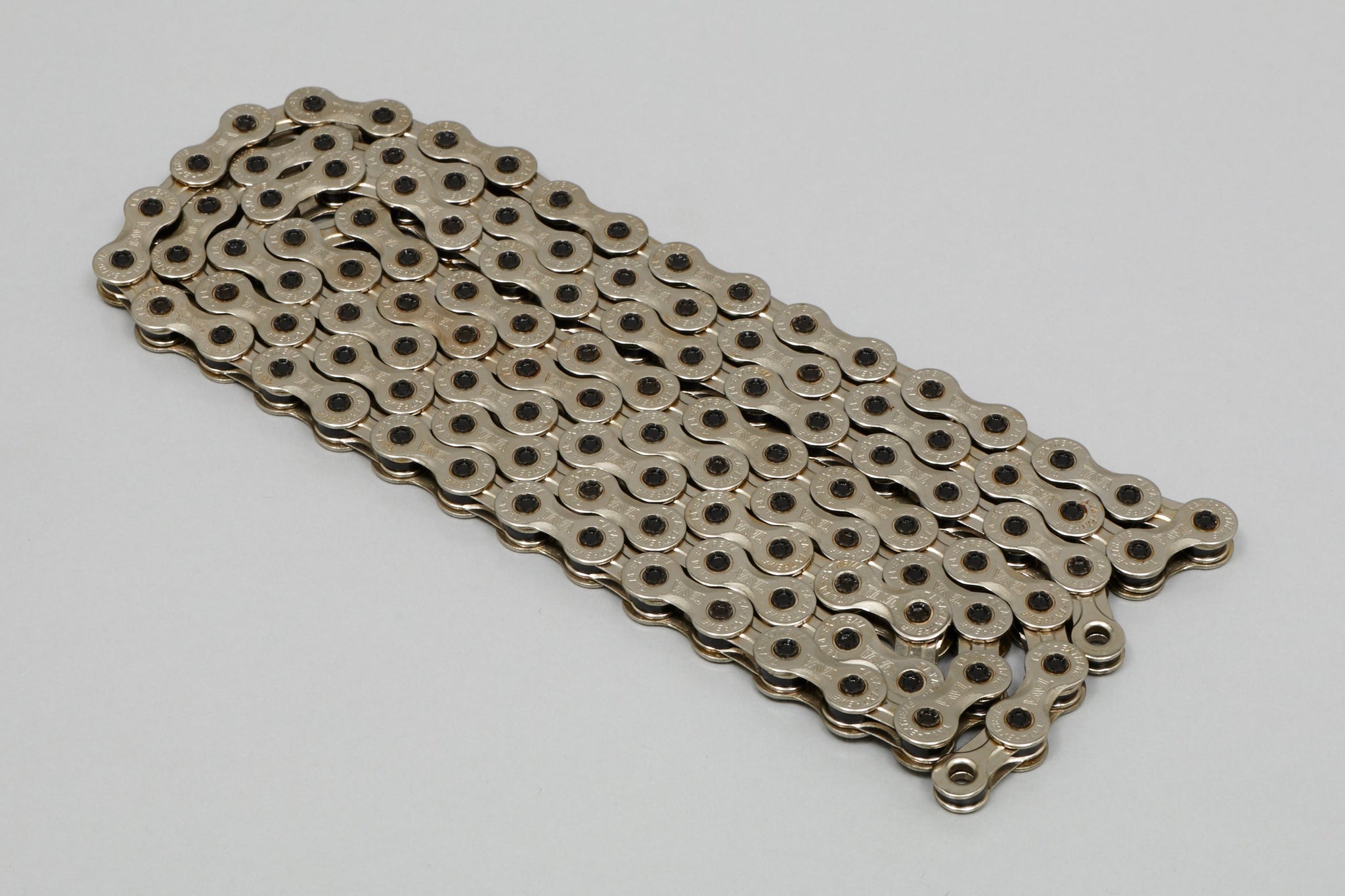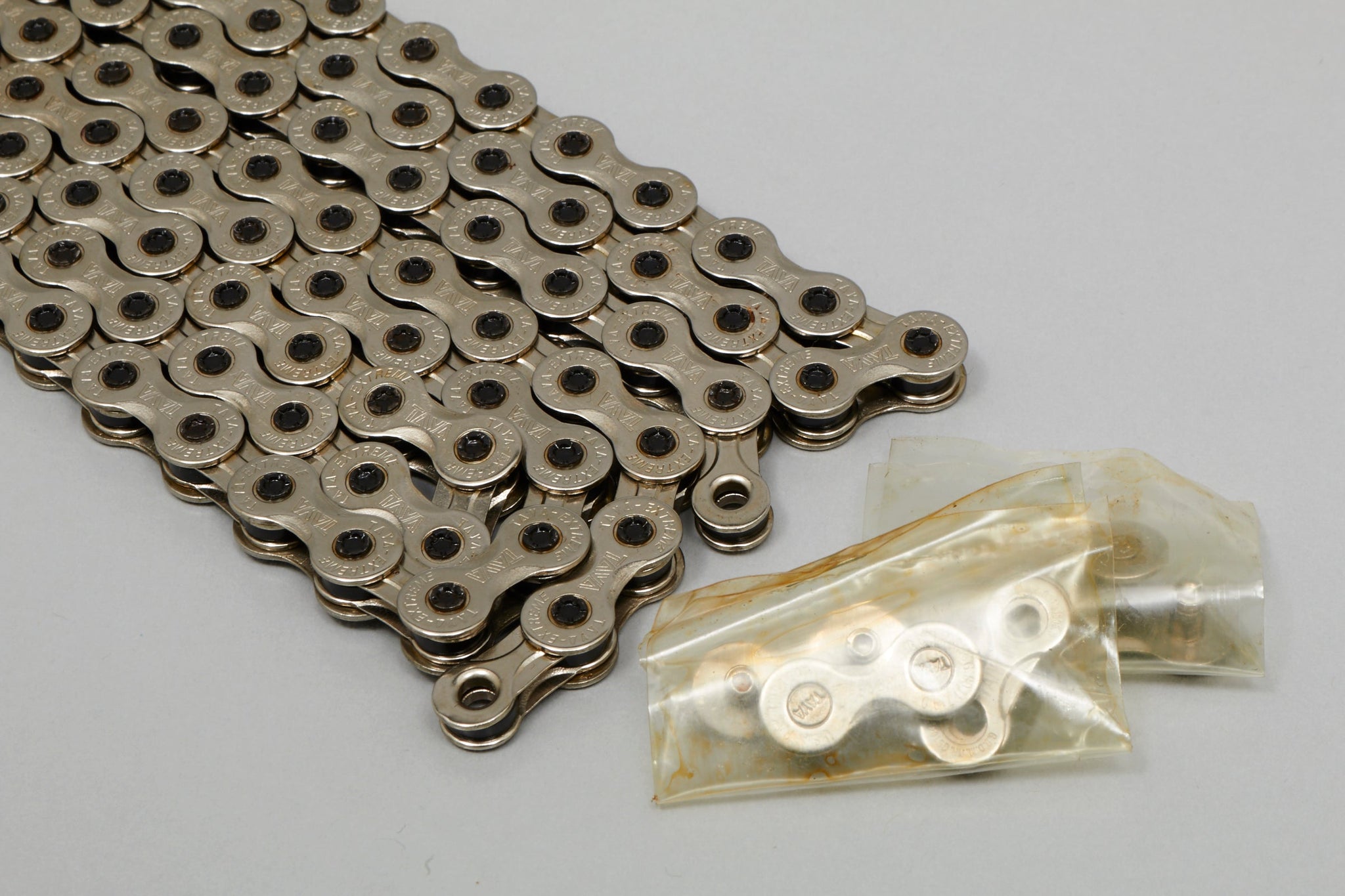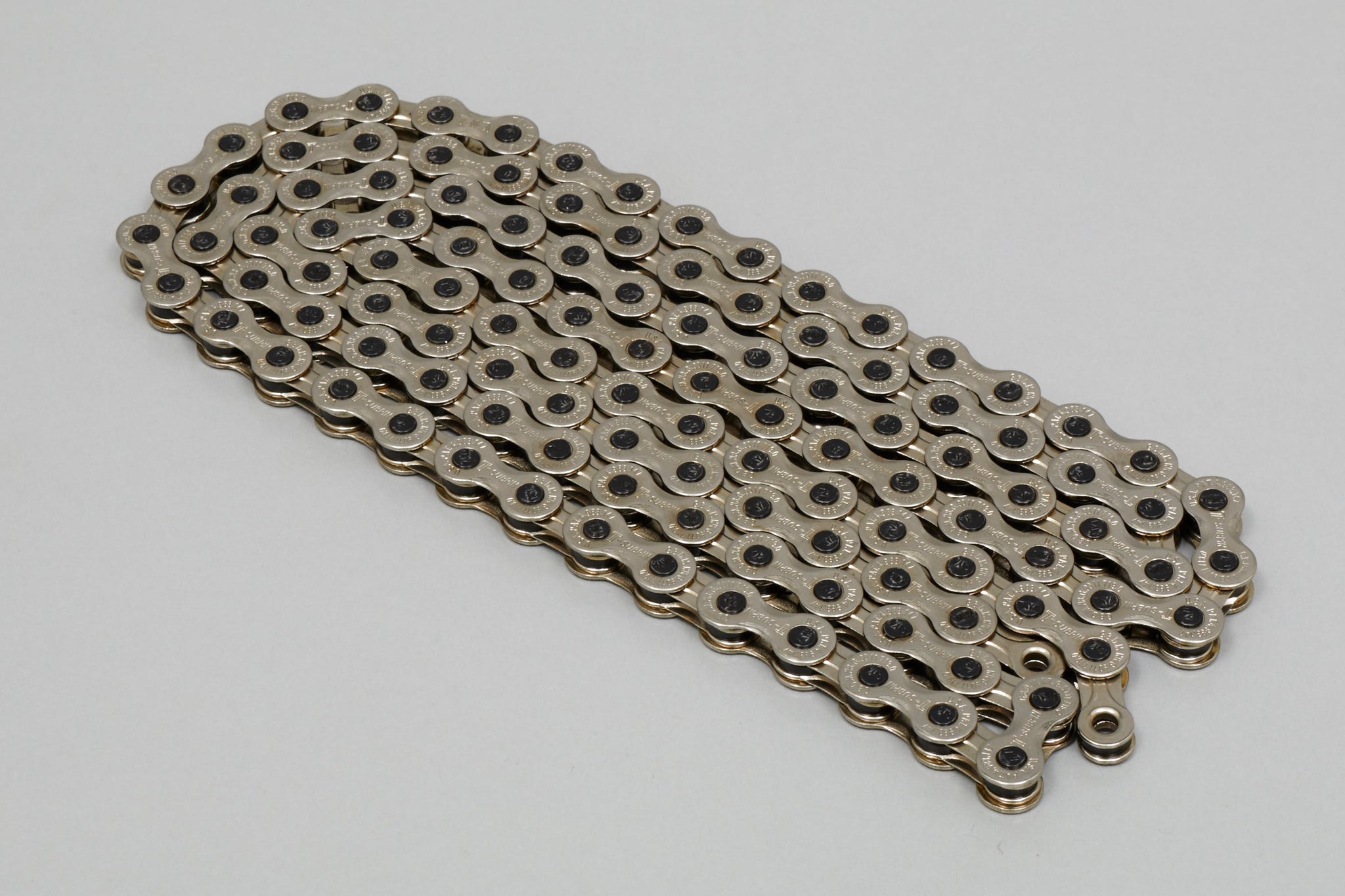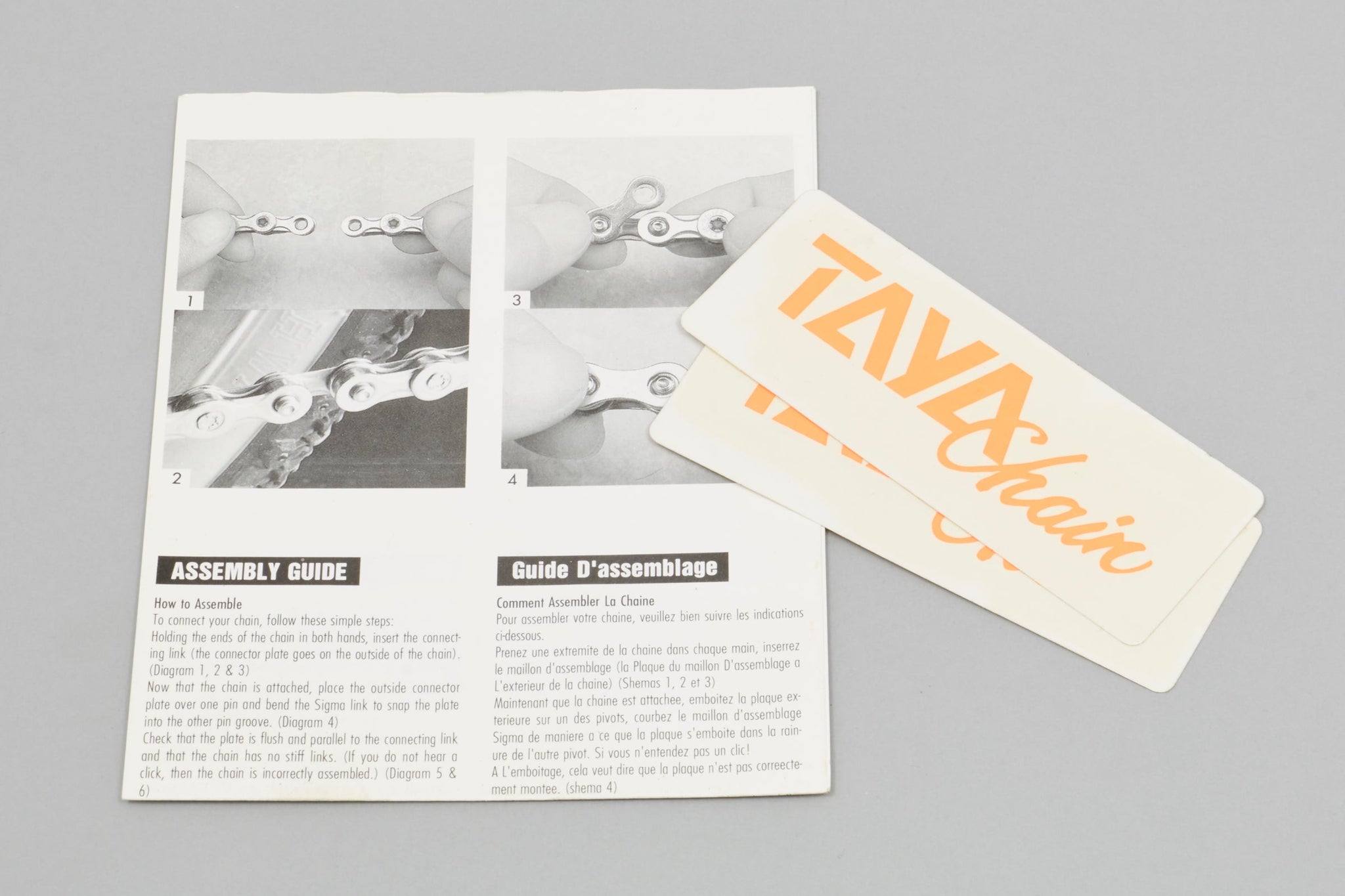- Frames
- Wheels
-
Parts
- Drivetrain & Gearing
- Downtube Shifters
- Bar Shifters
- Shift/Brake Levers
- Front Derailleurs
- Rear Derailleurs
- Chainsets
- Crank Arms
- Crank Parts
- Bottom Brackets
- Bottom Bracket Parts
- Chainrings
- Freewheels
- Cassettes
- Chains
- Gear Parts
- Braking
- Brake Sets
- Brake Calipers
- Brake Cantilevers
- Brake Levers
- Brake Parts
- Clothing
- Accessories
- Journal
8 Speed
Refine
view allProduct Type
D.I.D / Suntour Super Light (AP11) Accushift Plus NOS Classic 6/7/8 Speed Chain
£60.00
✓ Original part - produced in the 1990s
✓ New old stock! Still unused after all these years
✓ Worldwide shipping
D.I.D / Suntour Super Light chain, hailing from Japan and in production during the 1990s (yet still new & unused after all this time!). Made from steel and weighing in at 328 grams. A fine choice for keeping your classic bike authentic, but also great for any other compatible bike.
OVERVIEW
Model ID - AP11
Production Era - 1990s
Country - Japanese
Material - Steel
Weight - 328 g
Stock Code - D-CHN36C
NB - Identical to the Suntour AP11 chain. D.I.D made Suntour's chains in the 80s & 90s & some were stamped 'Super L'.
*New old stock items may have marks from storage over the years, and as we often have multiples they can vary from piece to piece, but they are always genuine new & unused items.
TECHNICAL INFO
Optimal Speed* - 6 Speed, 7 Speed, 8 Speed
Shifting System(s) - Suntour Accushift, All Systems (Indexed), Friction (Non-Index)
Outer Width - 7.3 mm
Cog Width - 3/32" (Standard)
Pitch - 1/2" (Standard)
Number of Links - 116
*See help section.
-
▼SHIPPING, TAXES & RETURNS
-
We've been safely sending orders around the world since 2010. There's a handy shipping calculator on the shopping cart page so you can see the cost of postage as soon as you've added it to your basket. Your order will be carefully packed and sent with tracking & insurance, we despatch most orders within 2-3 days but larger items and orders placed before the weekend can take an extra day or two to process.
We accept returns, please notify us within 14 days and ensure the item arrives back with us no later than 30 days after the order was received.
We don't charge VAT, however, if buying from outside of the UK please remember that there may be import fees to pay directly to the delivery company before receiving the order. Unfortunately we can’t advise on the exact costs as it varies from country to country, so please check your national rates before purchasing.
-
▼HELP SECTION
-
Optimal Speed - the ideal number of rear cogs, based on the outer width of the chain and the cog width it was designed for. For 6 Speed Shimano Uniglide a 5/6 spd chain will perform best.
Shifting System(s) - indexed shifters 'click' when you change gear. For 9 speed upwards (or Suntour Accushift), to guarantee the best performance we recommend using the dedicated chain. Otherwise, for 8 speed and below, or any speed when using friction shifting (non-index), you just need the correct outer width.
Outer width - measured across the rivets at the widest point, these are the approximate widths for different speed setups (up to 4 speed is also dependent on cog width):
Speed Outer Width 2 to 4 Speed (1/8”) 8.5 to 9.5 mm Up to 6 Speed (3/32”) 7.8 to 8.0 mm 7 Speed / ‘Narrow’ 6 Speed 7.3 mm 8 Speed / ‘Narrow’ 7 Speed 7.0 to 7.3 mm 9 Speed 6.5 to 6.7 mm Cog Width - the gap between the inner plates allows for different rear cog/sprocket widths. 3/32" is the standard for 5 to 8 speed, above that it’s 11/128”. For 4 speed or less, 3/32” and 1/8” were both used, for the latter you will need a 1/8” chain. A wider 3/16" moped chain can be used as a heavy duty opton for single cog setups if required).
Chain pitch - the distance between the rivets/pins. All chains will be 1/2" with two exceptions; 3/16" (“inch pitch”) for very early track bikes, or Shimano's short lived 10 mm pitch system from the 70s/80s.
Number of links - if you're unsure how many you need, measure your old chain (each link has two rivets) or one with a similar setup to yours.
Sachs-Sedis Sedisport (SC-40) Power Glide NOS Classic 7/8 Speed Chain
£45.00
✓ Original part - produced in the 1990s
✓ New old stock! Still unused after all these years
✓ Worldwide shipping
Sachs-Sedis Sedisport chain, hailing from France and in production during the 1990s (yet still new & unused after all this time). Made from steel and weighing in at 331 grams. A fine choice for keeping your classic bike authentic, but also great for any other compatible bike.
OVERVIEW
Model ID - SC-40
Production Era - 1990s
Country - French
Material - Steel
Weight - 331 g
Stock Code - D-G1-CHN53C
*New old stock items may have marks from storage over the years, and as we often have multiples they can vary from piece to piece, but they are always genuine new & unused items.
TECHNICAL INFO
Optimal Speed* - 8 Speed, 7 Speed (Narrow)
Shifting System(s) - All Systems (Indexed), Friction (Non-Index)
Outer Width - 7.1 mm
Cog Width - 3/32" (Standard)
Pitch - 1/2" (Standard)
Number of Links - 114
*See help section.
-
▼SHIPPING, TAXES & RETURNS
-
We've been safely sending orders around the world since 2010. There's a handy shipping calculator on the shopping cart page so you can see the cost of postage as soon as you've added it to your basket. Your order will be carefully packed and sent with tracking & insurance, we despatch most orders within 2-3 days but larger items and orders placed before the weekend can take an extra day or two to process.
We accept returns, please notify us within 14 days and ensure the item arrives back with us no later than 30 days after the order was received.
We don't charge VAT, however, if buying from outside of the UK please remember that there may be import fees to pay directly to the delivery company before receiving the order. Unfortunately we can’t advise on the exact costs as it varies from country to country, so please check your national rates before purchasing.
-
▼SAFETY & COMPLIANCE
- This product complies with the EU General Product Safety Regulation (GPSR). Professional installation and regular inspections are strongly recommended. Due to the product's age, extra care should be taken during use.
EU Authorised Representative - Global Trade Department NI Ltd, Office 834, Unit 6, 100 Lisburn Road, Belfast BT9 6AG, Northern Ireland
-
▼HELP SECTION
-
Optimal Speed - the ideal number of rear cogs, based on the outer width of the chain and the cog width it was designed for. For 6 Speed Shimano Uniglide a 5/6 spd chain will perform best.
Shifting System(s) - indexed shifters 'click' when you change gear. For 9 speed upwards (or Suntour Accushift), to guarantee the best performance we recommend using the dedicated chain. Otherwise, for 8 speed and below, or any speed when using friction shifting (non-index), you just need the correct outer width.
Outer width - measured across the rivets at the widest point, these are the approximate widths for different speed setups (up to 4 speed is also dependent on cog width):
Speed Outer Width 2 to 4 Speed (1/8”) 8.5 to 9.5 mm Up to 6 Speed (3/32”) 7.8 to 8.0 mm 7 Speed / ‘Narrow’ 6 Speed 7.3 mm 8 Speed / ‘Narrow’ 7 Speed 7.0 to 7.3 mm 9 Speed 6.5 to 6.7 mm Cog Width - the gap between the inner plates allows for different rear cog/sprocket widths. 3/32" is the standard for 5 to 8 speed, above that it’s 11/128”. For 4 speed or less, 3/32” and 1/8” were both used, for the latter you will need a 1/8” chain. A wider 3/16" moped chain can be used as a heavy duty opton for single cog setups if required).
Chain pitch - the distance between the rivets/pins. All chains will be 1/2" with two exceptions; 3/16" (“inch pitch”) for very early track bikes, or Shimano's short lived 10 mm pitch system from the 70s/80s.
Number of links - if you're unsure how many you need, measure your old chain (each link has two rivets) or one with a similar setup to yours.
Sedis Sedisport (GT7) Grand Tourisme NOS Vintage 6/7/8 Speed Chain
£55.00
✓ Original part - produced in the 1980s
✓ New old stock! Still unused after all these years
✓ Suitable for historic cycling events such as L'Eroica
✓ Worldwide shipping
Sedis Sedisport chain, hailing from France and in production during the 1980s (yet still new & unused after all this time). Made from steel and weighing in at 340 grams. A fine choice for keeping your vintage bike authentic, but also great for any other compatible bike.
If you're taking part in L'Eroica, Anjou Velo, Velo Retro or another similar vintage cycling event, this is fully compliant - so rest assured, the pre-1987 police won't lock you up for having the wrong chain!
OVERVIEW
Model ID - GT7
Production Era - 1980s
Country - French
Material - Steel
Weight - 340 g
Stock Code - D-G1-CHN51V
*New old stock items may have marks from storage over the years, and as we often have multiples they can vary from piece to piece, but they are always genuine new & unused items.
TECHNICAL INFO
Optimal Speed* - 7 Speed, 8 Speed, 6 Speed (Narrow)
Shifting System(s) - All Systems (Indexed), Friction (Non-Index)
Outer Width - 7.3 mm
Cog Width - 3/32" (Standard)
Pitch - 1/2" (Standard)
Number of Links - 116
*See help section.
-
▼SHIPPING, TAXES & RETURNS
-
We've been safely sending orders around the world since 2010. There's a handy shipping calculator on the shopping cart page so you can see the cost of postage as soon as you've added it to your basket. Your order will be carefully packed and sent with tracking & insurance, we despatch most orders within 2-3 days but larger items and orders placed before the weekend can take an extra day or two to process.
We accept returns, please notify us within 14 days and ensure the item arrives back with us no later than 30 days after the order was received.
We don't charge VAT, however, if buying from outside of the UK please remember that there may be import fees to pay directly to the delivery company before receiving the order. Unfortunately we can’t advise on the exact costs as it varies from country to country, so please check your national rates before purchasing.
-
▼SAFETY & COMPLIANCE
- This product complies with the EU General Product Safety Regulation (GPSR). Professional installation and regular inspections are strongly recommended. Due to the product's age, extra care should be taken during use.
EU Authorised Representative - Global Trade Department NI Ltd, Office 834, Unit 6, 100 Lisburn Road, Belfast BT9 6AG, Northern Ireland
-
▼HELP SECTION
-
Optimal Speed - the ideal number of rear cogs, based on the outer width of the chain and the cog width it was designed for. For 6 Speed Shimano Uniglide a 5/6 spd chain will perform best.
Shifting System(s) - indexed shifters 'click' when you change gear. For 9 speed upwards (or Suntour Accushift), to guarantee the best performance we recommend using the dedicated chain. Otherwise, for 8 speed and below, or any speed when using friction shifting (non-index), you just need the correct outer width.
Outer width - measured across the rivets at the widest point, these are the approximate widths for different speed setups (up to 4 speed is also dependent on cog width):
Speed Outer Width 2 to 4 Speed (1/8”) 8.5 to 9.5 mm Up to 6 Speed (3/32”) 7.8 to 8.0 mm 7 Speed / ‘Narrow’ 6 Speed 7.3 mm 8 Speed / ‘Narrow’ 7 Speed 7.0 to 7.3 mm 9 Speed 6.5 to 6.7 mm Cog Width - the gap between the inner plates allows for different rear cog/sprocket widths. 3/32" is the standard for 5 to 8 speed, above that it’s 11/128”. For 4 speed or less, 3/32” and 1/8” were both used, for the latter you will need a 1/8” chain. A wider 3/16" moped chain can be used as a heavy duty opton for single cog setups if required).
Chain pitch - the distance between the rivets/pins. All chains will be 1/2" with two exceptions; 3/16" (“inch pitch”) for very early track bikes, or Shimano's short lived 10 mm pitch system from the 70s/80s.
Number of links - if you're unsure how many you need, measure your old chain (each link has two rivets) or one with a similar setup to yours.
Shimano Deore LX (RD-M563) SGS NOS Classic Rear Mech
£110.00
✓ Original part - produced in the 1990s
✓ New old stock! Still unused after all these years
✓ Worldwide shipping
Shimano Deore LX rear mech (or derailleur, if you prefer), hailing from Japan and in production during the 1990s (yet still new & unused after all this time!). Made from steel/aluminium and weighing in at 288 grams. A fine choice for keeping your classic bike authentic, but also great for any other compatible bike.
OVERVIEW
Jockey Wheel Condition - New Old Stock*
Model ID - RD-M563
Production Era - 1990s
Country - Japanese
Material - Steel / Aluminium
Weight - 288 g
Stock Code - D-RM119C
*New old stock items may have marks from storage over the years, and as we often have multiples they can vary from piece to piece, but they are always genuine new & unused items.
TECHNICAL INFO
Shifting System - Shimano SIS, Friction
Speed* - 8 Speed
Max Cog Size - 32 Teeth
Max Chain Wrap - 38
Chain Width - 3/32" (Standard)
*See help section.
-
▼SHIPPING, TAXES & RETURNS
-
We've been safely sending orders around the world since 2010. There's a handy shipping calculator on the shopping cart page so you can see the cost of postage as soon as you've added it to your basket. Your order will be carefully packed and sent with tracking & insurance, we despatch most orders within 2-3 days but larger items and orders placed before the weekend can take an extra day or two to process.
We accept returns, please notify us within 14 days and ensure the item arrives back with us no later than 30 days after the order was received.
We don't charge VAT, however, if buying from outside of the UK please remember that there may be import fees to pay directly to the delivery company before receiving the order. Unfortunately we can’t advise on the exact costs as it varies from country to country, so please check your national rates before purchasing.
-
▼HELP SECTION
-
Shifting system - friction means your gear levers don't click when you change gear, when they do click it's referred to as indexed shifting. If you have indexed gear levers they must use the same system as the rear derailleur, if you're using friction levers you can mix and match.
Speed - the number of cogs at the back the derailleur was designed to be used with. This is important with indexed shifting, but with friction shifters you can in theory run any rear mech with any number of cogs, but you are more likely to have issues running high numbers of cogs with mechs from earlier eras.
Max cog size - the amount of teeth on the largest cog of your freewheel/cassette can be no greater than this to work with this derailleur.
Chain wrap - subtract the size of your smallest rear cog from your biggest, then do the same with your chainrings, add the 2 numbers together and you have your chain wrap.
Chain width - generally speaking, derailleurs designed for more than 3 speed use will fit a standard 3/32'' chain, the exception being some Cyclo & Simplex models from around the mid 1900s.
Sugino XD2 (XD 600T) NOS/NIB Classic Triple 170 mm Touring Chainset
£195.00
✓ Original part - in production from the 1990s to the 2000s
✓ New old stock & still in the original packaging!
✓ Worldwide shipping
Sugino XD2 crank/chainset, hailing from Japan and in production from the 1990s to the 2000s (yet still new & unused after all this time!). Made from aluminium and weighing in at 755 grams. A fine choice for keeping your classic bike authentic, but also great for any other compatible bike too.
OVERVIEW
Chainring Condition - New Old Stock*
Model ID - XD 600T
Production Era - 1990s & 2000s
Country - Japanese
Material - Aluminium
Weight - 755 g
Stock Code - D-CS104C
*New old stock items may have marks from storage over the years, and as we often have multiples they can vary from piece to piece, but they are always genuine new & unused items.
TECHNICAL INFO
Chainring Count - Triple
Tooth Count - 48 / 36 / 26
Bottom Bracket Type - Square Taper
BCD - 110 / 74 BCD
Chain Width - 3/32" (Standard)
Crank Arm Length - 170 mm
Pedal Threads - Standard (9/16" x 20 TPI)
Intended Speed* - 8 Speed, 9 Speed
Bike Type* - Touring
*See help section.
-
▼SHIPPING, TAXES & RETURNS
-
We've been safely sending orders around the world since 2010. There's a handy shipping calculator on the shopping cart page so you can see the cost of postage as soon as you've added it to your basket. Your order will be carefully packed and sent with tracking & insurance, we despatch most orders within 2-3 days but larger items and orders placed before the weekend can take an extra day or two to process.
We accept returns, please notify us within 14 days and ensure the item arrives back with us no later than 30 days after the order was received.
We don't charge VAT, however, if buying from outside of the UK please remember that there may be import fees to pay directly to the delivery company before receiving the order. Unfortunately we can’t advise on the exact costs as it varies from country to country, so please check your national rates before purchasing.
-
▼HELP SECTION
-
Chainring Count - the number of chainrings on the chainset. Fixed gear track bikes, single-speeds and some geared bikes use a single chainring, road bikes commonly use a double (two rings) and most touring bikes and mountain bikes will use a triple chainset (three rings).
Tooth count - the number of teeth on the chainring(s), the higher the number the harder the gear.
Chain width - this is only relevant for chainsets with a single chainring - if this is ⅛” then you must use a ⅛” chain. All double and triple (and some single) ring chainsets will use a standard 3/32” chain.
BCD - stands for Bolt Circle Diameter (sometimes referred to as PCD - Pitch Circle Diameter) and is only really needed when changing chainrings. To calculate the BCD, measure the distance in millimeters from the centre of any chainring bolt to the centre of an adjacent one and multiply it by 1.709 (you’ll likely need to round the resulting number up or down a little to get your BCD measurement).
*Intended speed - the number of cogs at the back the chainset was designed to be used with. We refer to it as ‘intended’ speed as most double and triple chainsets will actually work with different speeds than originally intended, but the further away you get from the intended speed the more likely you are to experience minor setup issues. The exception being some chainsets intended for 10 speed use or higher, with these it’s better to stick to the intended speed.
Crank arm length - this is measured from the absolute centre of the bottom bracket hole to the centre of the hole for the pedal.
Pedal threads - the thread type to match that of the chainset, this must match and is usually stamped on the pedals themselves and most bikes use a standard thread of 9/16” x 20 tpi. The exceptions being older French bikes, bikes with cheaper one-piece type chainsets and Shimano’s Dyna Drive system (easily identifiable as the pedal holes are about an inch wide!).
Bottom bracket type - ‘square taper’, as the name suggests have a square shaped axle that slots into the chainset and ‘cottered’ axles are round and secured by pins - pretty much every bike up until the 1990s would use one of these, cottered being the much earlier system. Since then, different manufacturers have introduced their own systems that are not interchangeable so you must use a chainset that matches.
Suntour XCU / VX (CH-AP20) Accushift Plus NOS/NIB Classic 6/7/8 Speed Chain
£110.00
✓ Original part - produced in the 1990s
✓ New old stock & still in the original packaging!
✓ Worldwide shipping
Suntour XCU / VX chain, hailing from Japan and in production during the 1990s (yet still new & unused after all this time!). Made from steel and weighing in at 329 grams. A fine choice for keeping your classic bike authentic, but also great for any other compatible bike.
OVERVIEW
Model ID - CH-AP20
Production Era - 1990s
Country - Japanese
Material - Steel
Weight - 329 g
Stock Code - D-CHN34C
*New old stock items may have marks from storage over the years, and as we often have multiples they can vary from piece to piece, but they are always genuine new & unused items.
TECHNICAL INFO
Optimal Speed* - 6 Speed, 7 Speed, 8 Speed
Shifting System(s) - Suntour Accushift, All Systems (Indexed), Friction (Non-Index)
Outer Width - 7.3 mm
Cog Width - 3/32" (Standard)
Pitch - 1/2" (Standard)
Number of Links - 116
*See help section.
-
▼SHIPPING, TAXES & RETURNS
-
We've been safely sending orders around the world since 2010. There's a handy shipping calculator on the shopping cart page so you can see the cost of postage as soon as you've added it to your basket. Your order will be carefully packed and sent with tracking & insurance, we despatch most orders within 2-3 days but larger items and orders placed before the weekend can take an extra day or two to process.
We accept returns, please notify us within 14 days and ensure the item arrives back with us no later than 30 days after the order was received.
We don't charge VAT, however, if buying from outside of the UK please remember that there may be import fees to pay directly to the delivery company before receiving the order. Unfortunately we can’t advise on the exact costs as it varies from country to country, so please check your national rates before purchasing.
-
▼HELP SECTION
-
Optimal Speed - the ideal number of rear cogs, based on the outer width of the chain and the cog width it was designed for. For 6 Speed Shimano Uniglide a 5/6 spd chain will perform best.
Shifting System(s) - indexed shifters 'click' when you change gear. For 9 speed upwards (or Suntour Accushift), to guarantee the best performance we recommend using the dedicated chain. Otherwise, for 8 speed and below, or any speed when using friction shifting (non-index), you just need the correct outer width.
Outer width - measured across the rivets at the widest point, these are the approximate widths for different speed setups (up to 4 speed is also dependent on cog width):
Speed Outer Width 2 to 4 Speed (1/8”) 8.5 to 9.5 mm Up to 6 Speed (3/32”) 7.8 to 8.0 mm 7 Speed / ‘Narrow’ 6 Speed 7.3 mm 8 Speed / ‘Narrow’ 7 Speed 7.0 to 7.3 mm 9 Speed 6.5 to 6.7 mm Cog Width - the gap between the inner plates allows for different rear cog/sprocket widths. 3/32" is the standard for 5 to 8 speed, above that it’s 11/128”. For 4 speed or less, 3/32” and 1/8” were both used, for the latter you will need a 1/8” chain. A wider 3/16" moped chain can be used as a heavy duty opton for single cog setups if required).
Chain pitch - the distance between the rivets/pins. All chains will be 1/2" with two exceptions; 3/16" (“inch pitch”) for very early track bikes, or Shimano's short lived 10 mm pitch system from the 70s/80s.
Number of links - if you're unsure how many you need, measure your old chain (each link has two rivets) or one with a similar setup to yours.
Taya Extreme Super Narrow NOS/NIB Classic 7/8 Speed Chain
£35.00
✓ Original part - produced in the 1990s
✓ New old stock & still in the original packaging!
✓ Worldwide shipping
Taya Extreme chain, hailing from Taiwan and in production during the 1990s (yet still new & unused after all this time!). Made from steel and weighing in at 403 grams. A fine choice for keeping your classic bike authentic, but also great for any other compatible bike.
OVERVIEW
Production Era - 1990s
Country - Taiwanese
Material - Steel
Weight - 403 g
Stock Code - D-CHN38C
*New old stock items may have marks from storage over the years, and as we often have multiples they can vary from piece to piece, but they are always genuine new & unused items.
TECHNICAL INFO
Optimal Speed* - 7 Speed, 8 Speed
Shifting System(s) - All Systems (Indexed), Friction (Non-Index)
Outer Width - 7.2 mm
Cog Width - 3/32" (Standard)
Pitch - 1/2" (Standard)
Number of Links - 114
*See help section.
-
▼SHIPPING, TAXES & RETURNS
-
We've been safely sending orders around the world since 2010. There's a handy shipping calculator on the shopping cart page so you can see the cost of postage as soon as you've added it to your basket. Your order will be carefully packed and sent with tracking & insurance, we despatch most orders within 2-3 days but larger items and orders placed before the weekend can take an extra day or two to process.
We accept returns, please notify us within 14 days and ensure the item arrives back with us no later than 30 days after the order was received.
We don't charge VAT, however, if buying from outside of the UK please remember that there may be import fees to pay directly to the delivery company before receiving the order. Unfortunately we can’t advise on the exact costs as it varies from country to country, so please check your national rates before purchasing.
-
▼HELP SECTION
-
Optimal Speed - the ideal number of rear cogs, based on the outer width of the chain and the cog width it was designed for. For 6 Speed Shimano Uniglide a 5/6 spd chain will perform best.
Shifting System(s) - indexed shifters 'click' when you change gear. For 9 speed upwards (or Suntour Accushift), to guarantee the best performance we recommend using the dedicated chain. Otherwise, for 8 speed and below, or any speed when using friction shifting (non-index), you just need the correct outer width.
Outer width - measured across the rivets at the widest point, these are the approximate widths for different speed setups (up to 4 speed is also dependent on cog width):
Speed Outer Width 2 to 4 Speed (1/8”) 8.5 to 9.5 mm Up to 6 Speed (3/32”) 7.8 to 8.0 mm 7 Speed / ‘Narrow’ 6 Speed 7.3 mm 8 Speed / ‘Narrow’ 7 Speed 7.0 to 7.3 mm 9 Speed 6.5 to 6.7 mm Cog Width - the gap between the inner plates allows for different rear cog/sprocket widths. 3/32" is the standard for 5 to 8 speed, above that it’s 11/128”. For 4 speed or less, 3/32” and 1/8” were both used, for the latter you will need a 1/8” chain. A wider 3/16" moped chain can be used as a heavy duty opton for single cog setups if required).
Chain pitch - the distance between the rivets/pins. All chains will be 1/2" with two exceptions; 3/16" (“inch pitch”) for very early track bikes, or Shimano's short lived 10 mm pitch system from the 70s/80s.
Number of links - if you're unsure how many you need, measure your old chain (each link has two rivets) or one with a similar setup to yours.
Tranz-X JD-002 Centeron G-Pulley Blue NOS/NIB Classic 10T Jockey Wheels
£30.00
✓ Original jockey wheels - produced in the 1990s
✓ New old stock & still in the original packaging!
✓ Worldwide shipping
\n
\n\nTranz-X JD-002 jockey wheels (or derailleur pulleys if you prefer), hailing from Taiwan and in production during the 1990s (yet still new & unused after all this time). Made from aluminium and weighing in at 46 grams. A fine choice for keeping your classic bike authentic, but also great for any other compatible bike.
\n\n\nOVERVIEW
Model ID - JD-002
Production Era - 1990s
Country - Taiwanese
Material - Aluminium
Weight - 46 g
Stock Code - D-JCK15C
NB - 2 sets of spacers supplied for 6/7 speed & 8 speed
*New old stock items may have marks from storage over the years, and as we often have multiples they can vary from piece to piece, but they are always genuine new & unused items.
\n
TECHNICAL INFO
Teeth - 10
Compatible Speed* - 6 Speed, 7 Speed, 8 Speed
Diameter (OD) - 38 mm
Thickness - 8.1 mm / 10.2 mm
Centre Hole (ID) - 5 mm
*See help section.
\n
- \n\n
- \n▼SHIPPING, TAXES & RETURNS
\n \n - \n
We've been safely sending orders around the world since 2010. There's a handy shipping calculator on the shopping cart page so you can see the cost of postage as soon as you've added it to your basket. Your order will be carefully packed and sent with tracking & insurance, we despatch most orders within 2-3 days but larger items and orders placed before the weekend can take an extra day or two to process.
\nWe accept returns, please notify us within 14 days and ensure the item arrives back with us no later than 30 days after the order was received.
\nWe don't charge VAT, however, if buying from outside of the UK please remember that there may be import fees to pay directly to the delivery company before receiving the order. Unfortunately we can’t advise on the exact costs as it varies from country to country, so please check your national rates before purchasing.
\n \n - \n▼HELP SECTION
\n \n - \n
Teeth - the tooth count has increased with the introduction of more gears, but this happened very gradually so 10 tooth jockey wheels were standard for a very long time.
\n*Compatible Speed - the number of cogs the jockey wheels were designed to be used with. When using derailleurs for indexed shifting it's important to stick to this, but friction shifting is much more forgiving so you're unlikely to have any problems using the next speed up or down, providing all the measurements are correct.
\nDiameter (OD) - the diameter of the jockey wheels, from the outside edge of the teeth. It’s important to stay close to the ones you're replacing to ensure they fit.
\nThickness - measured at the widest point, by the centre hole. The spacing has generally become narrower over the years to accommodate more gears.
\nCentre Hole (ID) - the inside diameter (usually inside the bushing/spacer if present). This rarely presents a problem, but some older jockey wheels have a different diameter so it's worth double checking.
\n\n\n\n\n\n
\n \n
Tranz-X JD-002 Centeron G-Pulley Red NOS/NIB Classic 10T Jockey Wheels
£30.00
✓ Original jockey wheels - produced in the 1990s
✓ New old stock & still in the original packaging!
✓ Worldwide shipping
\n
\n\nTranz-X JD-002 jockey wheels (or derailleur pulleys if you prefer), hailing from Taiwan and in production during the 1990s (yet still new & unused after all this time). Made from aluminium and weighing in at 46 grams. A fine choice for keeping your classic bike authentic, but also great for any other compatible bike.
\n\n\nOVERVIEW
Model ID - JD-002
Production Era - 1990s
Country - Taiwanese
Material - Aluminium
Weight - 46 g
Stock Code - D-JCK16C
NB - 2 sets of spacers supplied for 6/7 speed & 8 speed
*New old stock items may have marks from storage over the years, and as we often have multiples they can vary from piece to piece, but they are always genuine new & unused items.
\n
TECHNICAL INFO
Teeth - 10
Compatible Speed* - 6 Speed, 7 Speed, 8 Speed
Diameter (OD) - 38 mm
Thickness - 8.1 mm / 10.2 mm
Centre Hole (ID) - 5 mm
*See help section.
\n
- \n\n
- \n▼SHIPPING, TAXES & RETURNS
\n \n - \n
We've been safely sending orders around the world since 2010. There's a handy shipping calculator on the shopping cart page so you can see the cost of postage as soon as you've added it to your basket. Your order will be carefully packed and sent with tracking & insurance, we despatch most orders within 2-3 days but larger items and orders placed before the weekend can take an extra day or two to process.
\nWe accept returns, please notify us within 14 days and ensure the item arrives back with us no later than 30 days after the order was received.
\nWe don't charge VAT, however, if buying from outside of the UK please remember that there may be import fees to pay directly to the delivery company before receiving the order. Unfortunately we can’t advise on the exact costs as it varies from country to country, so please check your national rates before purchasing.
\n \n - \n▼HELP SECTION
\n \n - \n
Teeth - the tooth count has increased with the introduction of more gears, but this happened very gradually so 10 tooth jockey wheels were standard for a very long time.
\n*Compatible Speed - the number of cogs the jockey wheels were designed to be used with. When using derailleurs for indexed shifting it's important to stick to this, but friction shifting is much more forgiving so you're unlikely to have any problems using the next speed up or down, providing all the measurements are correct.
\nDiameter (OD) - the diameter of the jockey wheels, from the outside edge of the teeth. It’s important to stay close to the ones you're replacing to ensure they fit.
\nThickness - measured at the widest point, by the centre hole. The spacing has generally become narrower over the years to accommodate more gears.
\nCentre Hole (ID) - the inside diameter (usually inside the bushing/spacer if present). This rarely presents a problem, but some older jockey wheels have a different diameter so it's worth double checking.
\n\n\n\n\n\n
\n \n
Tranz-X JD-002 Centeron G-Pulley Silver NOS/NIB Classic 10T Jockey Wheels
£30.00
✓ Original jockey wheels - produced in the 1990s
✓ New old stock & still in the original packaging!
✓ Worldwide shipping
\n
\n\nTranz-X JD-002 jockey wheels (or derailleur pulleys if you prefer), hailing from Taiwan and in production during the 1990s (yet still new & unused after all this time). Made from aluminium and weighing in at 46 grams. A fine choice for keeping your classic bike authentic, but also great for any other compatible bike.
\n\n\nOVERVIEW
Model ID - JD-002
Production Era - 1990s
Country - Taiwanese
Material - Aluminium
Weight - 46 g
Stock Code - D-JCK14C
NB - 2 sets of spacers supplied for 6/7 speed & 8 speed
*New old stock items may have marks from storage over the years, and as we often have multiples they can vary from piece to piece, but they are always genuine new & unused items.
\n
TECHNICAL INFO
Teeth - 10
Compatible Speed* - 6 Speed, 7 Speed, 8 Speed
Diameter (OD) - 38 mm
Thickness - 8.1 mm / 10.2 mm
Centre Hole (ID) - 5 mm
*See help section.
\n
- \n\n
- \n▼SHIPPING, TAXES & RETURNS
\n \n - \n
We've been safely sending orders around the world since 2010. There's a handy shipping calculator on the shopping cart page so you can see the cost of postage as soon as you've added it to your basket. Your order will be carefully packed and sent with tracking & insurance, we despatch most orders within 2-3 days but larger items and orders placed before the weekend can take an extra day or two to process.
\nWe accept returns, please notify us within 14 days and ensure the item arrives back with us no later than 30 days after the order was received.
\nWe don't charge VAT, however, if buying from outside of the UK please remember that there may be import fees to pay directly to the delivery company before receiving the order. Unfortunately we can’t advise on the exact costs as it varies from country to country, so please check your national rates before purchasing.
\n \n - \n▼HELP SECTION
\n \n - \n
Teeth - the tooth count has increased with the introduction of more gears, but this happened very gradually so 10 tooth jockey wheels were standard for a very long time.
\n*Compatible Speed - the number of cogs the jockey wheels were designed to be used with. When using derailleurs for indexed shifting it's important to stick to this, but friction shifting is much more forgiving so you're unlikely to have any problems using the next speed up or down, providing all the measurements are correct.
\nDiameter (OD) - the diameter of the jockey wheels, from the outside edge of the teeth. It’s important to stay close to the ones you're replacing to ensure they fit.
\nThickness - measured at the widest point, by the centre hole. The spacing has generally become narrower over the years to accommodate more gears.
\nCentre Hole (ID) - the inside diameter (usually inside the bushing/spacer if present). This rarely presents a problem, but some older jockey wheels have a different diameter so it's worth double checking.
\n\n\n\n\n\n
\n \n
SUBSCRIBE TO GET THE FIRST SCOOP
Exclusive content, new products, subscriber only promotions. Delivered to your inbox by tiny cyclists, every few weeks.
Don't worry, you can unsubscribe at any time.
PEDAL PEDLAR
T: 02036758003 // E: info@pedalpedlar.co.uk
© 2025 Pedal Pedlar.
Ecommerce Software by Shopify

